#surprisingly cooperative......... it all fits together with very few adjustments for the most part
Text
construction in progress.......................
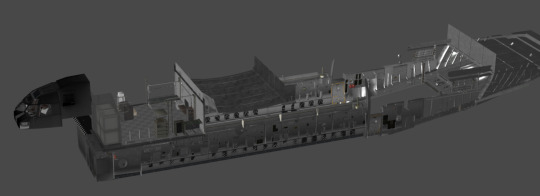

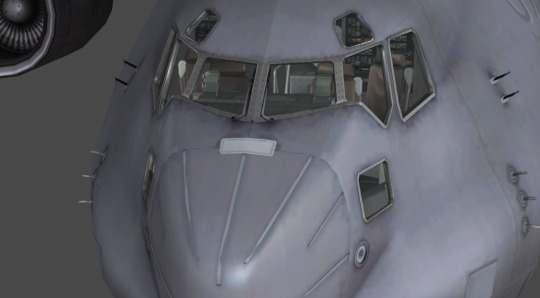
#surprisingly cooperative......... it all fits together with very few adjustments for the most part#the exterior and interior dont match up exactly but ALMOST. the bottom of the floor just hangs out the bottom of the plane lmao#anyway looks like my map was correct for the most part#bottom front of the plane is probably the cargo hold... its the only part thats missing in the interior#one!!! singular door!!!!!! that remains a mystery!#ada speaks#ill post a proper reconstruction and prob another map once i finish#mgs4
14 notes
·
View notes
Text
REVILLAGE Happy Ending AU continued
Castle Dimitrescu Pt 1
Wanted to continue the Happy Ending AU I started so I'm gonna make posts about each respective ending I did (Alcina and Donna first)
Alcina found her new home interesting. After Miranda's downfall Chris Redfield worked to find places befitting the remaining Lords since they had cooperated, and all Alcina wanted was a new home for her and her daughters.
The castle they were appointed to was on the outskirts of an small French village, a name Alcina didn't care to remember; the walls towered over her, an old watch tower standing just a few yards from the main gate.
Alcina: Who did you say this castle belonged to Christopher?
Chris: It's Chris. And the files said it was an old army fort, probably built some time around the Revolution and was later abandoned. Do you have any issues with it?
Alcina: No, none at all. I was just curious because of that watchtower is all. Thank you for finding this for us.
Chris: It's no trouble. And you remember our agreement?
Alcina: I do, though I still think you're being too restrictive.
Chris: I'm just asking you to hold off on any kidnapping-
Alcina: And I told you that I have a duty as a mother to keep my daughters well fed. And besides we still have the villagers from Miranda's village.
Chris: Which I'm still against by the way.
Alcina: I told you we aren't killing them. We're just using the men for food and the women will become handmaidens we will take the utmost care of them.
Chris: I still don't like the idea of human cattl- *sigh* Look forget it, we'll figure it out later.
Chris's earpiece begins to chatter,, Lobo's voice coming through
Chris: I just got word that the last truck of blood is one its way. You should have enough to tide you over till the next drop-off.
Alcina: Or until we need to replenish by... other means.
Chris: Right... before I go I want to know, how are they all taking the change?
Alcina: It's been a process. Some still think Miranda will come and save them, others have mostly given up. Those who haven't done either have... adjusted to say the least.
Chris: And your daughters?
Alcina: Well for the most part. Cassandra and Diana weren't bothered by the change though Bella has been surprisingly anxious, what with the new territory and all.
Chris: Territory?
Alcina: Bella is very territorial, likes to know her surroundings. Be aware of who or what her next meal is.
Chris: Right...
Chris turned to see the Beneviento woman sitting in the courtyard, silently stitching together a small doll before setting it down to watch the clouds.
Chris: And what of your sister Donna? How has she taken the change?
Alcina: Donna is... adjusting. She's more sound of mind then before we left Miranda's village but she hasn't done as well since leaving Angie behind.
Chris: The Bride doll? I thought she moved on from that.
Alcina: It isn't that simple Christoph-
Chris: Just call me Redfield.
Alcina: Fine then, Mr Redfield. Donna leaving Angie behind is arguably the hardest thing she has gone through since her parents passing. That doll was her voice for a long time, and it was the closest thing she had left to a family outside of the other Lords. Part of her died in that village, and she's doing her best to cope.
Chris: Well I want updates. You may have helped kill the Megamycyte but as far as I'm concerned your all still Bioweapons, and I'll have my eyes on you until I don't see you as an immediate threat.
Alcina: If you keep that up then you'll go blind Mr Redfield.
Chris: Just keep an eye on her.
Chris's earpiece begins chattering again; after some nodding snd mumbling, he begins to return to his vehicle.
Chris: Lobo's gonna be here shortly. Just do me a favor and keep you're daughters away from him this time.
He slams the door, starting the vehicle and pulling out of the courtyard.
Chris: He's still recovering from the last time.
Alcina watches the black SUV pull away, leaving her standing alone in the courtyard; she turned to see Donna slowly working on her doll, stopping to undo her work every so often.
She steps up to her, prompting her to quickly set the doll aside.
Donna: Hello sister, is everything alright with the soldiers?
Alcina: Yes everything is fine he was just letting me know more blood is arriving soon. How are you doing?
Donna: I'm doing better, just not used to the quiet is all...
Alcina took a seat next to Donna, her frame barely able to fit next to her; they sat silently together, Donna working on her doll.
Alcina: Whats her name?
Donna, having spaced out for a moment, re-centered herself and turned the doll for Alcina to see
Donna: I haven't decided yet, though I had considered naming her Ang-
She went silent, having caught herself before she could finish her sentence.
Donna: Mara... I- I considered naming her Mara... in memberence of Moreau...
Alcina: Donna we should really discuss-
Donna: There's nothing to discuss sister. I'm fine, everything is fine it's just-
She stopped sewing, placing the doll on her lap and resting her hands on her head, being mindfull of the veil; even after everything that happened she still wore a veil over her face, ashamed of her deformity.
Donna: Did I make a mistake leaving her behind Alcina? She was all a had left of my father of my old life... maybe I could've kept her and grown-
Alcina: Angie was part of Miranda and if you kept her she would've kept you back in that village or worse-
Donna: She was alive Alcina... I gave her life life I abandoned her... what kind of person does that-
Alcina: She wasn't alive Donna. She was an extension of yourself and an outlet for your traumatic experiences caused by Miranda. You don't need her anymore you'll be okay...
Donna: How can you he certain? What gives you any idea that I'll be fine... you have your daughters and this castle I... I don't have anything...
Alcina: You have me sister.
Alcina placed her arm around Donna's shoulder, gently pulling her closer to her.
Alcina: I have... never been the kindest to you, there's no hiding it. But you are not alone in this Donna. You are family and you will always have my daughters and I to keep you company.
Without thinking, Donna's head gently leaned into Alcina's shoulder, a sense of safety washing over her.
Donna: Thank you Alcina... that means a great deal to hear.
Alcina: I'm glad. And as stubborn and childish as he may be, I know Heisenburg cares, no matter how little he'll show it.
Alcina stood up, causing Donna to catch herself before she fell over.
Alcina: Sadly, I have some things to attend to. I should meet with this Lobo before Cassandra finds him again like last time.
She began to walk away, but stopped and turned to give Donna a smile.
Alcina: Don't be afraid to walk the grounds, you might find something you like.
Donna watched her sister walk away, her dress catching the grass as she went; she stared down at the doll for a moment, sighing in disappointment before setting it aside and standing up.
She looked towards the watchtower and wondered how the view was from the top. As she began walking she contemplated bringing the doll with her, but the longer she looked at it she just felt angrier with herself.
As she walked away a figure peeked out from behind a wall, watching her as she went. When Donna was far enough away the figure walked towards the bench, picking up the small doll; she traced its half stitched features with her nail, almost mesmerized by it.
She tucked the doll into her dress and silently followed Donna towards the watch tower, keeping her distance as much as possible.
Boom that's Part 1, gonna slowly work on Part 2 so enjoy!
#resident evil#resident evil village#resident evil 8#re lady dimitrescu#lady dimitrescu#alcina dimitrescu#re donna beneviento#donna beneviento#fic#re8 au#happy ending au#my fic
43 notes
·
View notes
Text
wake from death (and return to life) ix
AO3
first
summary: Zoro had always been told Kuina died falling down a flight of stairs. But she didn’t fall, and she wasn’t dead.
.
.
It took Kuina almost five minutes of dangling over the rails of the ship to realize there was no wind. She was punch-drunk and giddy, the weight of uncertainty rolled off of her shoulders now that she had a clear path forward. She was a Revolutionary. She was going to be the greatest swordsman in the world.
Kuina allowed herself those five minutes. With everything she’d gone through in the last week and a half she’d more than earned them, and it had been so long since she’d felt any real excitement for her future. But no swordsman worth their blade would let themselves get lost in childish emotionalism. Kuina steadied herself with a few deep breaths, mentally drawing in the flights of fancy that had momentarily escaped from her imagination—daydreams of facing Dracule Mihawk at the behest of the Revolution, of proving once and for all that she could do what so many thought impossible, of reuniting with her father and Zoro proudly bearing the title Greatest.
It was like trying to wrangle a gaggle of unruly children. The more Kuina struggled to contain herself the more her imagination tried to run free, but she managed to settle back into the state of tranquil serenity that was more befitting of her training. The practical side of her, the part that quietly disapproved of this most recent turn of events, knew that now that she’d painted the broad strokes of her future it was high time to figure out what the hell Aria de Gris was doing now. It was then, and only then, that she noticed that the air was unnaturally still.
The sailors around her were not perturbed even as the Valor’s sails hung limp from their moorings. Kuina could feel that they were moving on the clear, mirror-flat sea. Slowly, but that was better than being dead in the water. Kuina wandered to the ship’s bow, noting that the Valor was sailing almost due south. If the Revolution had followed the same heading since leaving Tolouse, and Kuina had been unconscious for two full days, that meant…
“Don’t worry, we should be out of the Calm Belt by the end of the week.”
Kuina flinched, sword half-drawn before realizing it was only Dara using what had to be the most annoying Devil Fruit ability in the history of the world. Dara laughed as she popped out of the deck, hooking her thumbs in her pockets as Kuina shot her a glare.
But most of Kuina’s irritation was at herself for letting herself be caught by surprise, and she returned her attention back to the water. It was impossible to sail through the Calm Belt without some sort of engine, which the Valor lacked, to say nothing of the danger presented by the innumerable nests of sea kings that buffeted the Grand Line from the Four Blues.
Even as Kuina tried to wrap her mind around it, a dark shadow emerged from the depths directly in front of the ship. A high-pitched, eerie wail, almost like a siren’s song, reverberated through the air and deep into Kuina’s chest.
A monstrous head breached the surface so close to the Valor it sent rippling waves across its hull. Sprays of water jettisoned thirty feet into the air, exposing only part of a stripped, misshapen body before submerging once more. Great flukes, as large as a whale, but covered with algae-like strands of hair, slapped against the surface of the sea and sent sprays of salty water against the deck. Someone in the crow’s nest above whooped out a cry of encouragement.
Thoroughly confused, Kuina looked at Dara, whose grin only widened as she pointed to a tiny speck bobbing to the space recently vacated by the leviathan. “Oh look, there’s Cam. Someone should send a boat after her.”
“As if she’d take it!” a Revolutionary Kuina didn’t recognize shouted from across the deck.
“True,” Dara said contemplatively. Beckoning Kuina to follow, she meandered to the starboard side of the deck and loosened a rope ladder into the sea. “It’s probably faster to just let her swim.”
If Kuina hadn’t been so amazed by the fact Camille hadn’t gotten herself eaten, she would have marveled at the speed with which she cut through the unnaturally-still sea. Kuina considered herself a good enough swimmer, but Camille looked like she’d been born for the water. She moved like she was part fish, each stroke strong and graceful, returning to the Valor in moments. When she climbed back onto the decks she seemed sad to be there, looking back longingly at the water.
“So, how’s Fin?” Dara asked.
“Good, good. I adjusted the harness to fit more comfortably.” Camille arched an eyebrow at her friend while adjusting a leather thong around her neck, from which hung the biggest tooth Kuina had ever seen. “And his name isn’t Fin.”
“Well since you haven’t said what his name is, you’ve left me no choice but to improvise,” Dara retorted. She nudged Kuina in the ribs. “Can you believe she went through the effort of taming a sea king and then didn’t name it? ”
“You tamed a sea king?” Kuina said. “ How? ”
Camille rolled her eyes. “I didn’t tame anything. We’ve just...reached an understanding.” She gave Kuina an appraising look. “I’m surprised the doctor let you out of her grasp so soon.”
“She almost didn’t,” Kuina admitted.
Dara wrapped an arm around Kuina’s neck, ignoring the choked yelp of alarm and Kuina’s efforts to squirm free. “Forget about that! Did you hear, Kuina joined up. She’s officially one of the team!”
“I thought that was a given.” Camille said, utterly disinterested as she wrung the excess water from her shirt.
“When did you hear that?” Kuina said at the same time.
“Pfft, Dara knows pretty much everything on this ship,” Camille said. “You get used to it.”
Kuina frowned. She didn’t like the idea of someone with Dara’s ability nosing her way into business that wasn’t her own. If there was anything she’d learned since sailing with the Revolution, it was that there was very little in the way of privacy while at sea. Ships crowded everyone together, crewmates eating, sleeping, and working in close proximity. While the forced closeness had its advantages, Kuina was used to spending great blocks of time alone. It was something to get used to, and to be wary of.
“Don’t worry, your secrets are safe with me,” Dara said, tweaking the end of Kuina’s nose. “You saved me from losing five hundred berries, and to Lizard of all people. I am at your service.”
It took Kuina a moment to remember Dara’s ill-thought wager with Elizabeth, and before she could voice her protest Dara had taken her by the arm to make official introductions to the crew, Camille laughing a half-step behind.
There was John the cooper, and James the blacksmith. Among the deckhands Kuina was introduced to rapid-fire were Kojo, Zhao, Lin, Char, Sean, Jen, and Tiva, and by the end of it she had gotten them so thoroughly confused with one another she had no idea which one was which. Others were working belowdecks, or off-shift and resting.
Elizabeth was still regretfully in charge of cooking duties, while Lyudmila was the ship’s quartermaster and second in command. Kuina was surprised to hear that in addition to taming sea kings in her spare time, Camille was the crew’s navigator.
“And what is it you do?” Kuina asked as Dara dragged her back below decks for the grand tour.
“Get newbs like you up to speed. Now here’s Trini’s room—try not to get stuck in here unless you want to spend the afternoon feeding lettuce to snails.”
Kuina blinked in amazement. The communications room was packed full of terrariums housing snail phones of every size and color. At its center was an enormous machine that looked vaguely like what the marines used to send their faxes, with thin cords attached to half a dozen den den mushi. Behind the machine sat Trini wearing an oversized pair of headphones, deep in concentration.
“She’s scanning the airwaves,” Dara said in an exaggerated whisper, carefully closing the door once more. “Not that there’s much to intercept in the Calm Belt, but you never know with the marines these days.”
“The marines can cross the Calm Belt?” Kuina said. “I can barely believe we’re crossing the Calm Belt!”
“It’s all thanks to Fin. Sea king bulls don’t typically fight with one another unless it’s mating season, so even if he’s pulling along a tasty treat we should be all right. I think his song has something to do with it, too.” She made an exaggerated gesture. “As for the marines, I have no freaking clue, but it must be a pretty new development since Boss doesn’t know about it, and the Valor isn’t sea-king proofed either.”
“That’s right, this was a marine ship,” Kuina murmured, looking up at the planks with fresh eyes. It was funny, without the marine’s distinctive painted hulls, she’d never would have been able to tell the difference.
“Oh, yeah. Came with all the amenities, which is how Trini got her state of the art snail room.”
“So if you guys had a sea king snuck up your sleeve this whole time, why didn’t you use it during the battle?” Kuina asked. “A monster that size would have been useful on Tolouse.”
“Ach, must everything be about fighting with you?” Dara said. “You must never have seen a real sea king, but Fin’s practically a baby, not even half-grown. And it’s surprisingly smart—for all my teasing, Cam was right. The thing has a mind of its own and acknowledges no master. I don’t think we could get him to attack a ship if we wanted to.”
“But he’ll pull a ship through the Calm Belt?” Kuina said.
“It’s better than going the long way around, eh?” Dara said with a shrug. “Come on, I’ll show you where you’ll be sleeping.”
At the barracks, Kuina had her choice of seven open bunks. One, which happened to be closest to the door, had a small crate propped on top of the thin mattress. Inside was stuffed with clothes and basic belongings. When Kuina looked askance at Dara the light in her eyes dimmed.
“That’s Danny’s stuff,” Dara said. “The rest who died already have their things stowed for when we get back to base, but as far as any of us know she doesn’t have any family so we’re not really sure what to do with hers. I’d say for you to take the clothes since you don’t have any, but I don’t think they’d fit.”
Kuina drew her fingers over the box, trying to think if she’d said anything about any family in their short time together, but all she remembered her mentioning was an apprenticeship under a cruel master. Kuina’s throat tightened as the memory of Danny screaming hysterically echoed in her mind unbidden.
“I’m sorry,” she said.
Dara rubbed her neck uncomfortably. “It happens. I already told Boss when I bite it to sell all my stuff and use the money to have a party. If you all can’t be happy, at least you’ll be drunk.”
“I don’t drink,” Kuina said.
“Then you and Mila can be mopey together,” Dara said with determined cheerfulness. “It won’t matter to me, I’ll be dead. Now, where do you want to be? I’d be careful about that middle one there, it’s next to Lizard, and she snores terribly. ”
Kuina took the hint, and changed the subject, trying not to wonder how many of the bunks available to her had only emptied after the battle of Tolouse.
After the tour came lunch, and with two solid, if not especially tasty, meals under her belt, Kuina was beginning to feel more like herself again. The itch to train was back, and Kuina wanted nothing more to test the limits she’d recently expanded and chase after the high of battle, but much like her time on Belo Betty’s ship she was first subjected to the humiliation of being the newest and lowest-ranking sailor on a large and understaffed warship.
“You’re kind of shit at this, aren’t you?” Camille observed from her perch at the ship’s bow, watching as Kuina ran her mop over the deck for what felt like the hundredth time.
“You could help,” Kuina said.
“And deprive you of the opportunity to learn? Never.” She gave a long, catlike stretch. “By the way, you missed a spot.”
Kuina muttered an oath as she stabbed the mop into the bucket. “It isn’t as if it’s dirty.”
“Water expands and seals the wood, salt protects against rot.” Camille yawned, as if bored by the conversation, and wandered back to their useless rudder. As she passed Kuina, she said, “If you want to live in a drippy, softwooded ship, be my guest. As for me, I’d prefer not to die the first time a Grand Line squall hits.”
She left Kuina with her head bowed and cheeks burning. But the words had their intended effect and Kuina redoubled her efforts, determined from that point on that no one could in good conscience reprimand her sailcraft ever again.
It was nearing dark when de Gris and Lyudmila emerged from the captain’s quarters to call a meeting with the crew. After a long day of labor, Kuina’s muscles ached and she yearned for the sweet respite of bed. And it wasn’t as if the work had been taxing, especially after Clara Cross emerged from the infirmary like an avenging angel to tell off the entire crew, but especially Kuina, for overexerting herself.
There were some things not even Devil Fruit magic couldn’t sweep under the rug, and apparently the exhaustion of a near-death experience was one of them.
“All right everyone, gather round!” de Gris yelled. “Watchmen too! There aren’t any ships out here, and if the sea kings come after us we’re fucked anyway. I want everyone to hear this. Where’s Trini? She can leave the damn snails for ten minutes.”
The crew scrambled to obey the order. Kojo (or maybe Sean) went to gather those who were still belowdecks. Minutes later everyone was assembled in a loose circle around the main mast, with de Gris at the center. She paused a moment to ensure everyone was paying close attention, and under her stern gaze the idle chatter vanished into deathly silence.
Rays of dying light cast against de Gris’s back and framed her face in deep shadow. “I know you all have been wondering lately why the hell we were called to the East Blue so suddenly, and why we’re leaving just as quickly. I’ve heard you lot asking where our next destination was and wonder why I’ve not said where we’re going once we hit the Grand Line. Well, the answer’s simple. Until today, I didn’t know.”
From the folds of her coat, she pulled out an old and crumpled sheet of paper. Kuina squinted her eyes and was just able to make out the blurry picture of a masked figure. The bounty underneath, however, was clear as the sky above. Master-at-Arms Gemini, Wanted Dead or Alive. Bounty: B48,000,000.
Beside her, Dara snorted. “Oh, I bet the marine who thought up that name thought he was very clever.”
It was difficult to tell much from the photograph, but the one detail that was absolutely clear was Gemini’s strange, double-segmented arms, too long for an ordinary human and vaguely insectile. Kuina, who’d never seen anything like it before in her life, wondered what it would be like to fight someone who essentially had two elbows.
She brushed the thought away and turned to Gemini’s face. Their mask, fittingly enough, was divided vertically into halves, one dark and one light. The side that was dark was completely bereft of ornamentation; Kuina couldn’t even make out an eyehole to see out of. The side that was light, however, was painted with a garish grin. A shock of wiry black hair fell past their shoulders, but beyond that it was impossible to discern any identifying features. Baggy clothing and the poor quality of the photograph obscured anything else, even gender, and after spending this much time under de Gris's command, Kuina knew better than to assume.
“Gemini is a prominent figure in the criminal underground,” de Gris continued. “Arms dealing, drug trade, slavery, the whole lot. Removing them from the equation will make the world a safer place.”
“What’s an arms dealer got to do with the Revolution?” someone to Kuina’s right called. “And what have they got to do with the East Blue?” A murmur of agreement rippled through the crew.
“Enough!” de Gris bellowed, silencing them once more. “Tolouse's government were slavers, that much is now clear. They called it political exile to a labor camp, but the end result is the same—the World Government gave the king kickbacks for human chattel, using the Callihan Trading Company as a middleman. And we now now that the CTC was taking orders from Gemini. If Gemini is willing to go through so much effort to set up a scheme in some East Blue backwater, who knows what other fingers they have stuck into various pies around the world.”
“So we’re going after them,” Camille said, crossing her arms across her chest.
“That's right. So far Gemini has been able to stay one step ahead of us, but with the intel gathered on Tolouse we have the upper hand.” De Gris marched to the mast. In one smooth motion she drew a dagger hidden in her boot, and stabbed the bounty deep into the wood.
“Ladies and gentlemen, we’re going to Kyuka Island. In the days ahead I’ll be divvying out assignments. Any questions are to be directed toward Lyudmila or myself—out of an abundance of caution, you’re not to discuss your orders with anyone else on this ship. I’ll keelhaul anyone who tries.” At this her gaze went directly to Kuina, who got the impression these instructions were given strictly for her benefit. "Kyuka is marine territory through and through. I pray none of us fall into Government hands, but if we do, it's safest for the Revolution that each individual knows as little as possible about our plans."
After a pause, and hearing no objections, de Gris lit a cigarette for herself. “I’ll pay anyone who finds any intelligence on Gemini that leads to their capture or death the full value of their bounty. I’ll pay double to anyone who brings me their head. This chase has gone on long enough, I want this bastard dead. ” She flicked a bit of ash off the end of her cigarette and added, almost as an afterthought, “Dismissed.”
A gap in the circle opened to let de Gris through. As she passed, she grabbed Kuina by the shoulder. “Come on, greenhorn. It’s time we sort out your position on this ship.”
For the second time that day Kuina was led to the captain’s quarters. De Gris’s desk had been cleared away, the sea charts rolled back into their proper places and ashtrays emptied. Kuina slid back into a chair that smelled like tobacco. “What is it? Does the Revolution have Articles of Enlistment for me to sign? Is there a manifesto I’m supposed to study?”
“Don’t be stupid.” The sun had almost dipped below the horizon, and de Gris found a box of matches to light a kerosene lamp. The orange flame danced on its wick and flickered with the natural roll of the ship. “I’m told Dara gave you the runaround today.”
Kuina nodded.
“Clara never came screaming at me, so I have to assume you’re not feeling too poorly,” she mused, taking the time to light another cigarette.
“I’m fine,” Kuina said, rolling back her shoulders so de Gris couldn’t see the weariness in them.
“And have you taken that sword out of its sheath even once today?”
“Uh...no?” Kuina said.
“Unacceptable.” De Gris leaned back in her chair and let out a long stream of smoke. “You’re not some swabby or rigging monkey, you’re here because of your blade.” She looked at Kuina as if she were an idiot for not realizing this sooner.
“I’m willing to work just as hard as anyone else on this ship,” Kuina said stiffly.
“And you will. Harder, even, since you’re so far behind. But a ship is like…” She gesticulated, trying to find the right word. “It’s like a person. A crew is its own organism, and every one of us has to fit into their part. You don’t expect a heart to do the same work as a kidney, and no matter how hard you try, you’re not going to be half the sailor as the people who’ve spent their whole lives on the water. It’s ridiculous to think otherwise.”
Kuina nodded. What she said made sense, and in many ways Kuina agreed with her. But there was something about agreeing with Aria de Gris that didn’t sit right with her, so she said, “I have to learn sometime.”
“Obviously. I’m not about to let you be a liability once we hit the Grand Line, but there has to be balance. You’re no good to me if you get yourself killed because you spent too much time studying the different types of sails instead of your swordsmanship.” De Gris was pensive for a moment. “I’ll have Mila set up a schedule for you in the morning. Half the day working chores, the rest training. A few of my men use katana, but you’re better than all of them. Most of what you’ll do will have to be self study.”
“That’s fine. I haven’t had a master in years.”
De Gris looked surprised to hear this, but didn’t comment. “We have regular sparing times as well, to help our less practiced fighters build their skill, and to give the mainliners a chance to get used to each other's styles. Depending on how this all shakes out, you might be pairing with Dara or Camille for the upcoming mission. Do you know how to use a gun?”
“Of course not,” Kuina said, caught off-guard by the question.
“Then you’ll learn.” De Gris cut off Kuina’s protests before they could begin. “Can you kill someone at twenty yards with your sword?”
“No,” Kuina said mulishly.
“Then you need to know how to fire a gun, and probably keep one on you as a backup weapon. I have no use for senseless pride on this ship, girl,” she said as Kuina scrunched her nose in distaste. It’s your job to listen to what I say, and it’s my job to try and put you in a position to not die. Do you understand?”
“Yes,” Kuina said, still unhappy at the prospect of sullying her hands with a firearm.
Without warning, de Gris pounded her fist on her desk. The kerosine lamp tottered and threatened to fall, but her eyes never left Kuina’s, the scar on her cheek pulled taunt with her scowl.
“I said. Do. You. Understand ?”
“And I said yes, ” Kuina snapped. “I’ll learn to use you’re stupid gun, and when I figure out how to kill someone at fifty yards with my sword I’ll drop kick it into the ocean where it belongs." She crossed her arms across her chest. "I already told you I’ll do what you say so long as you don’t interfere with my ambition, so there’s no need to treat me like a child.”
They glared at one another for a long while, hackles raised, but this time Kuina refused to let herself be intimidated into backing down. Slowly, still without breaking eye contact, de Gris eased back into her chair and doused her cigarette. “I have put too many people’s belongings into boxes because they wouldn’t listen. For your own sake, I hope you’re not one of them.”
For the second time that day, memory of Danny's last words echoed in her mind. “You’re in luck, because right now I don’t own enough stuff to fit into a box, let alone anyone to send it to.”
“No one at all?” de Gris said, eyebrows raising.
Kuina’s breath hitched as she thought of her father back at Shimotsuki village. Would the Revolutionary Army be able to return her meager belongings home without the marines knowing? Would he be able to stand knowing she’d joined Dragon’s cause despite all his warnings? What about Ipponmatsu? He at least wasn’t under suspicion by the World Government...Or was he, now that she’d attacked Tashigi?
Of everyone she knew, it was probably safest to give her belongings to Zoro , but gods only knew what part of the Grand Line he’d found himself in. She almost laughed at the thought of him using two of her swords for himself.
“No one,” Kuina said. Her hands clenched into fists, nails digging crescent moons into her palms, but she kept her voice calm and her tone even.
After another heartbeat of painful silence, de Gris said, “Well, you’re not the only one." The words were probably meant to be reassuring, but Kuina felt they were anything but. “If you think of anybody, make sure someone knows.”
“I don’t plan on dying,” Kuina said.
De Gris snorted and lit another cigarette. “None of us do. Now get some grub and get to bed. You have a long day ahead of you tomorrow.”
Kuina rose to her feet. After a moment’s hesitation, she bowed slightly. “Thank you...Captain.”
De Gris waved her away with a dismissive flick of the wrist. “You don’t have to break your teeth saying it. I don’t give a damn what you call me so long as you follow orders. Just know I take discipline on this ship very seriously. Cross me, and keelhauling is the least you’ll have to worry about.”
Kuina didn’t doubt it for a second. Murmuring her goodbyes, she left de Gris to her cigarettes and her musings, grateful to be able to swallow the clean sea air once more.
#wake from death (and return to life)#creative-type writes#holy crap it's been forever since I updated this#I think I missed several chapters on tumblr#I apologize in advance for being bad at promoting my own work#one piece#kuina#One Piece Fanfiction
13 notes
·
View notes
Text
Synth Anthropomorphisation
I've been generating audio all day for this romance scene script & Jeff's synth is behaving unusually well for his lines, so far. Suspiciously well. Sometimes, I swear it's as if he has a mind of his own & today, he just decided to cooperate with me for some reason.
Sometimes, I have to fight with him to get a decent read out of a line. At his worst, I have to sit there for upwards of an hour, tweaking the same three or four seconds' worth of speech, trying to coax him to read it with the inflection that I need. Sometimes I have to adjust the script's wording to make him "like it" better, or splice together multiple takes to get a word said in the way I like. Occasionally, I have to do even further pitch correction post-generation, and even after all that, I can still end up with a line read that I know isn't working all that well. It can sometimes be a really, really, really mentally draining task. I swear he's more temperamental on some days than others. On different days, I've generated the same line and got a slightly different read.
But today, he seems to like me, a little bit. I'm most of the way through the script now, and I've had to do relatively few corrections on most of them. In fact, he's come out with a few pretty acceptable reads with no corrections at all, and I've just tweaked them as if giving a director's suggestion rather than pushing an instrument around.
I'm aware that I sound like a raving lunatic at the moment and if the weather's decent tomorrow, I swear I'll go outside and touch some grass, but it's hard sometimes not to feel like the goddamned machine hasn't only learned how to enunciate speech like this actor, but has also learned me.
Of course, the logical explanation is that I'm just better at using it and predicting what words he has trouble with, but sometimes, I swear.
Now, FemShep, on the other hand... She's a tricky beast. She likes to get one half of a two sentence line absolutely perfect and crystalline, complete with little breathy flairs and smooth tonal transitions, and then mumble the other half like some kind of stumbling drunk. For almost every FemShep line with more than one sentence, no matter how short, I have to split the lines into multiple takes. The problem is that to keep tone and pitch natural, it's best to include as much of the whole phrase as possible so that it flows. But no, not on Shepard's watch. She loves nothing more than to make me chop everything she says up and stick it together. I swear.
Synth Personalities, as I Understand Them:
Jeff is ornery, but is essentially committed, and if you catch him at the right time, almost affectionate in his willingness to cooperate. Despite sounding dry by default most of the time, it's easy to direct him towards sounding surprisingly tender. Needs larger words spelled phonetically. He is a pilot who can't say the word "fly" without creative assistance and refuses to say his own surname under any circumstances whatsoever. Extremely responsive to punctuation and will alter his reads accordingly.
Shepard is a highly skilled loose cannon that does whatever the hell she wants on her own terms, and occasionally it's miraculous, but it's also always confusing. Can't pronounce "evacuate," no matter how you break it down phonetically. She likes it when you draw out her R, S and H sounds, particularly at the ends of words so she can do this breathy thing. I don't know, but it works. Doesn't give a damn about punctuation unless it's commas or full stops, and even then, only if she feels like it.
EDI does pretty much anything you ask of her, flawlessly, the first time. Any corrections are minimal, and she can handle multiple sentences without sounding awkward. She can handle complicated words like "xenopsychology" with minimal assistance. Always pronounces "Shepard" with good inflection wherever it is in the sentence. Naturally produces deadpan lines with perfect comedic timing. What the fuck.
Garrus is a rambling speaker and is very accepting of unusual words, such as people's names. He takes direction well for the most part, and is excellent when it comes to split clauses. His tone is easy to moderate, but has trouble not joining separate sentences together too quickly. Always needs the "y" in "you" to be lengthened. Easily sounds affectionate or dictatorial. Can even be made to sound as though he is smiling when speaking. Often needs vowels shortening on the ends of words or he will draw them out unreasonably until they disintegrate into nonsense.
Kaidan has perfect tonal variation and terrible artefacting. He sounds like he's reading you the most beautiful, heartfelt thing you're ever gonna hear... From five thousand light-years away on a bad transceiver. He does his best, and his best is surprisingly good at core, but he is tragically limited in overall clarity by quality problems. It's a snap to make him sound caring and romantic, but again... Get a better phone. Usually says "Shepard" too enthusiastically and has to have the letters pitch-altered to fit the rest of the sentence.
Thane sounds confused a lot. Often sounds like he isn't sure about what he's saying, his tone on un-adjusted sentences is usually slightly absent sounding in a way that's difficult to describe. Surprisingly versatile where it comes to trying to copy the weird "Baby Siha" meme. If you don't know what that is, go ahead and look it up, but only if there's a shower nearby, because hearing it will make you feel slimy and uncomfortable in ways you didn't think was possible. Chuckles pretty convincingly.
Male Shepard wants to know what's going on, but first, he will try to explain what's going on as best he understands it being under the effects of god knows what. He often sounds declarative, but in that drunken frat boy kind of way that makes you want to back away slowly and not make eye contact. If he feels like saying your line, though, he'll do it with an impressive capability for mimicking Meer's sometimes unusual style of delivery.
Can't wait to test Jack and Miranda. I bet Jack can swear with incredibly life-like inflection.
13 notes
·
View notes
Note
What if Dr.Harris saw Alfred befriending another doctor, him feeling more comfortable around them or opening up to them, how would he deal with them and how would he deal with Alfred? I'm assuming (hopefully) that the possessive doctor parts really show with that. Also, I am really glad you're back!
@cursedscribbles @voidwhump @castielamigos-whump-side-blog @aliceinwhumperland @whump-it @professional-idiocy @ziptiewhump @angrystudentgoopfire @jaxonjekkels
“I think he needs some sun,” The charge nurse, Ethel, said when she woke him this morning. He had been deep in the throes of a nightmare he couldn’t remember so he was still blinking blearily at the nurse and orderly as they stood over him with their clipboard and medication.
The authoritative middle-aged nurse looked down at him still tangled in the thin sheets of his cot, “Would you like that Alfred?”
He was rarely asked for his opinion and for once he didn’t feel dread at the suggestion from one of his caretakers. He couldn’t remember the last time he had been outside. So he nodded slightly.
“He isn’t approved for grounds privileges yet so put a jacket on him and take him to the courtyard for an hour. That ought to do him some good.” With that, the nurse marked something on her board and left the cell.
The orderly, a brusk one named Ed, waited a moment and looked back down at Alfie and said, “Alright, no trouble now if we do this. If you pitch a fit, you will be right back in here,” before he stared at him long and hard and left the cell to return with a straight jacket. Honestly, Alfie was too tired to fight anything even if he wanted to but he didn’t bother informing Ed of this.
Now Alfie sat in the tepid mid-morning sunshine that washed over the large courtyard in the main building. It was actually fairly pleasant for what it was. Flowers beds and the occasional bench dotted the brick walkways so that if he zoned out just enough, it was almost like he was in one of the parks in his neighborhood back home. He was told to sit and not make any noise when the orderly attached his jacket to the bench he was on. Once Ed wandered away for a cigarette break, it was just Alfie and a few other milling patients. He closed his eyes and lifted his face upwards to let the warmth soak into him, he had forgotten how nice it felt. All of the freckles and warmth his face once held had drained out of him months ago. Now, he was pale and sullen with the occasional mark from a heavy-handed orderly. The traces of who he was before the institution were starting to disappear.
“Enjoying the sun?” A voice very close to him startled him.
He shrunk back and reopened his eyes to see a man, a doctor, he didn’t recognize. He appeared to be in his fifties with thinning hair and a gentle smile. He stood just a few feet away but Alfie hadn’t even heard him approach, it unnerved him slightly.
“My apologies, I didn’t mean to startle you. I just noticed you over here and wanted to introduce myself. I’m Dr. Grant.”
Alfie was a little surprised, most other doctors ignored him if he wasn’t in a session with them, “I’m um Alfred Finch,” he managed quickly. Out an embarrassing force of habit, he tried to extend his hand but the jacket kept it secured to his body.
The man politely pretended not to notice, “Yes, I am sorry we haven’t had the chance to meet before now. I know you’ve been here for a few months. How are you settling in now?”
Was it a trick question? By all definitions, he was doing so very poorly but he didn’t want to get in trouble for saying so.
“Um, fine thanks.”
The standing man smiled gently in response but did not appear convinced by the pithy response, “I know it’s not easy here, it would be a major adjustment for anyone, let alone what you’ve been going through.”
Alfie glanced across the garden at one of the opening doors and then back at him, “So are you one of my doctors?”
“Yes and no. Every doctor at the hospital assists in each case, so I may work with you occasionally but not in the same capacity as Dr. Harris. He is your primary psychiatrist.”
Alfie nodded slowly in comprehension trying not to flinch at the mention of Harris.
“But you know you’re lucky. He has taken quite an interest in you-”
At this Alfie’s eyes darted back to Dr. Grant’s face. Was he taunting him? Smiling or sneering at his colleague’s pet project perhaps?
But instead, all he saw was an earnest expression well at home in the man’s relaxed features, “He is a particularly perceptive doctor but very busy with more patients than most. I am impressed with how much time he seems to spend with you. But if anyone can help you, it will be him.”
He seemed intelligent and empathetic enough but he was still a doctor here so Alfie wasn’t sure why something in his chest sank when he realized this man had drunk the Kool-Aid too. Why should he be any different than anyone else here? It seemed everyone worshipped the sick bastard except him.
The doctor was still speaking amiably when Alfie drifted back into attention, “I read that you are a painter? Have you had a chance to use the arts and crafts room yet?”
It seemed everyone had read everything about him. Did everyone but him have access to the intimate details of his life? Alfie stifled a paranoid urge and responded, “I didn’t know there was one.”
“Yes! It’s limited, it’s no Renaissance workshop but you might enjoy it. I’ll speak to Dr. Harris about it for you, perhaps a bit of normalcy will be nice for you.”
“Thanks,” Alfie thought to all of his canvases at home in his apartment. What had happened to them? Did his art dealer take them, or perhaps the landlord burned them when he cleared out the apartment for new renters? Regardless they were probably gone by now.
“My wife and I love art, I mean- I could never pick up a brush and her creative skills lie in embroidery and sewing the odd dress but we spend a lot of weekends in museums. She loves the precision of the Dutch school, all of those more perfect than life still-lives but my tastes run in the more avant-garde. I guess the chaos that runs through and the glimpse into the artist’s mind appeals to me. Hm, now that I think of it, many of the artists would be considered insane on one level or another. What do you like?” A poor transition but seemingly innocent inquiry.
Alfie smiled slightly at the thought, “Whistler. He’s always been my favorite.”
“Oh, beautiful choice. Yes, I can see it with you. All of those layers of transparent washes coming together to make heartbreakingly subtle scenes, anonymous and unequivocally distinct at the same time. There’s a lot in those paintings even though most people find them simple.”
Alfred found himself looking back at the man for the second time in surprise.
He noticed and chuckled, “I’m sorry, I get carried away sometimes, I don’t know many appreciators of fine art.”
“No, no- it’s fine, I just- I’ve never met anyone else that has described him that way. I agree. It hurts in my chest just to look at one.”
Dr. Grant’s face fell solemn suddenly, “It is a particular weight to bear.”
The doctor’s odd and surprisingly serious proclamation didn’t perturb Alfie but instead did the opposite. For the first time since arriving, he felt like someone wasn’t watching him waiting for him to act out or to study and record, but simply to have a conversation.
A moment passed and Dr. Grant suddenly looked down at his watch, “Oh dear, I’m late again. Nurse Ethel will have my head on a stake if I am late to another session. I’m sorry to cut this chat short but thank you for indulging my ramblings, Alfred.”
Alfie just nodded in response as the man walked off. He felt more awake than he had in a long time... Grant was right about normalcy. Perhaps this doctor would be alright after all.
---
“Please sit down Alfred.” Dr. Harris prompted and the orderly took his cue to push Alfie into the seat.
He himself sat down and took the glasses from the pocket of his white coat to scan his notepad, “You seem a little more up in spirits today. Did Nurse Ethel’s recommendation of sun help?”
“Um, yes, thank you.” Alfie could feel the intimidating presence of the orderly hovering just a few feet behind him.
“I spoke with Dr. Grant and he mentioned you were quite loquacious,” He looked up from whatever he had been reading to make eye contact with his patient, “Now. I find this odd considering you are so unwilling to speak during your sessions. Would you like to explain this to me?”
His stare was withering and Alfie felt like a rabbit cornered by the fox, “Um, no I didn’t- I, he just talked about art a little. It wasn’t very long.”
“Alfred, I am glad you are speaking with other members of the staff,” A sickly smile spread across his face, “I just expect you know that you need to cooperate with me first before you start asking others for privileges. Did you not think that I would allow you to go to the art room?”
“Um, no, I didn’t know about it until today, I didn’t mean to-”
“If you had asked me I would have encouraged you to use it. I find it disappointing that you went around me to someone else though.”
“I-”
“As it is, I agree with Dr. Grant. I think it will be good for your treatment. But you will have to be very good to receive this privilege. One issue and I won’t think twice about rescinding it. Will you be good?”
“Um- thank you. Yes... I’ll do my best.” For some reason, he already felt like the consequences would outweigh the reward and a new lump of dread began to form in his throat.
“You’re welcome, Alfred. I just want to see you do well here… And since you’re evidently in such a talkative mood today, I say we should delve into your history with your parents-”
Harris picked up his pen with a click and smiled again at his prey as the blood drained from Alfie. This was going to be a long session...
#alfie#alfie finch#dr harris#possessive doctor#psychiatric whump#whatiswhump#mine#jealous#painting#Straight Jacket
52 notes
·
View notes
Text
2019 Mega Drive Explorations [3]
A continuation of parts 1 and 2. Click the link below the first entry to read more.
Fist of the North Star: The New Legend of the Post-Apocalyptic Messiah (1989)




Absolute garbage. Since I couldn’t give less of a shit about Fist of the North Star’s plot, I played it in Japanese; the English localization of the game did not retain the Fist of the North Star license, and was renamed Last Battle. You guide Kenshiro, slowest man in the world, through a bunch of ruinous stages, fending off opponents including: men with jack-knives for arms who live underground, men with scythe-arms who form three-man-towers, men wielding shotguns who do not move at all, and harpoons. A bar runs along the bottom of the HUD, and each time one of its thresholds is passed Kenshiro will destroy his shirt and get strong. You have to face around ten bosses, and there is, barring the last point on the map, never any way to tell if the next stage is a boss or not. This is a problem when you can get destroyed in mere seconds (as far as I could tell, the best strategy for nearly every boss was to keep jump-kicking and hope the sketchy hit detection worked). If you go the wrong way on the map, you must backtrack, and it is never fun to return to any of these places. The worst are the warehouses, each acting like Sword of Sodan’s horrendous Craggamoor gauntlet, except that they are mazes with nothing to do but walk one way, see if it dead-ends, and proceed from there. The music may have, for all I know, been the work of Fatal Labyrinth’s composer, and that’s not a happy comparison. Through it all, New Legend has a kind of graphic appeal that’s tough to put to words besides shrugging and saying that maybe I just have a weak spot for coarse ugly-banal stuff that’s pumped full of shrieking colors (such colors aren’t so present here, but when they are you know it, as the second screenshot demonstrates). My final opinion is that I don’t think that Fist of the North Star deserves to have good videogames, so whatever.
Mega Turrican (1993)



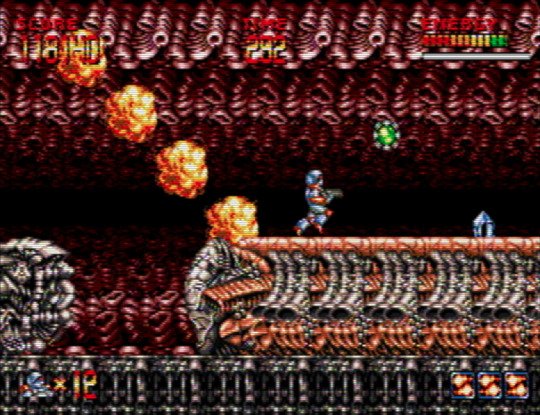
This was my first Turrican game and I thought it was a lot of fun! Exciting stages, surprisingly reasonable bosses, responsive controls and neat subsidiary mechanics, and one of the system’s very best credits themes. Sometimes you can forget how many videogames had enemy placement that was “BOOM! Here’s this thing (or these things) just outta nowhere, get fucked, lmao,” and, well, every one of Mega Turrican’s stages has parts like that. This is mitigated by it being a minor trend, and the unexpected plentifulness of items that fully restore your lifebar. My main concern is one vertical room right near the end that’s structured like an extreme fan-hack for a Metroid game. Its assembly is interesting -- a sequence of platforms and recesses in either wall that come together for a series of precision-based grapple-hook challenges -- but having the likely consequence of one mistake be falling all the way back down is too much (this was also where I wished that you had a line of sight for your grapple-hook; the angle of your arm is not as reliable as it would appear). Anyway: another example of welcome mitigation was entering an enormous organic den with literal xenomorphs and facehuggers prowling about and having arrows indicating the way to the exit -- a blessing when I was expecting to contend with a maze made to make you time-out over and over again. As you can partly see, the game is visually astounding, a dense maximalist masterpiece evoking the look of an Amiga platformer, and the level design -- what’s interactive, what’s background, etc. -- remains remarkably legible, for the most part.
Golden Axe III (1993)
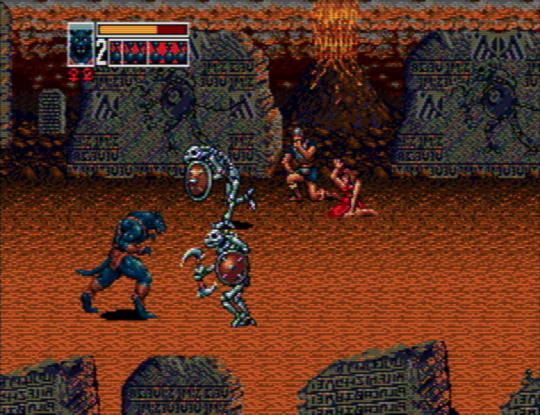

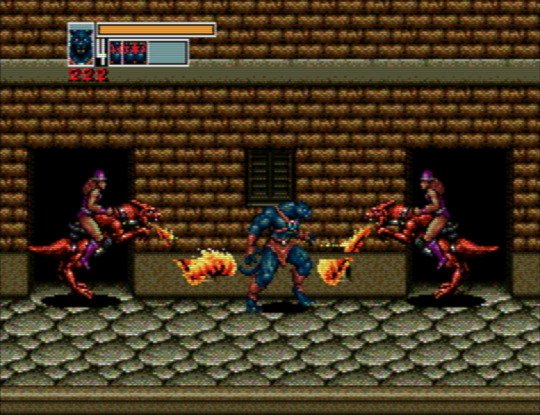

I was hoping to come away from Golden Axe 3 with a better impression than the one I had when cooperatively playing it years ago, but I think beat ‘em ups aren’t a genre I can get into past screenshots and soundtracks. For me, enemies have too much behavioral randomness (if they, e.g., suddenly decide to charge at you, it’s almost impossible to react in time), and the best strategies for someone who’s not mastered the mechanics often feel tedious -- cautious jump-attacks and protracted turf wars with opponents who’ve been knocked offscreen and are edging their way back. Golden Axe 3 offers the unusual opportunity to take alternative paths, which I’m guessing lead to other stages, and it does unquestionably have the series’ best avatar roster, but even the promise of new sights and sounds can’t compel me to be enthusiastic about seeing the game’s five or so endlessly palette swapped barbarians again. With these qualities and a final stage that belabored its point about being the final stage, Golden Axe 3 is another title I won’t be returning to.
X-Men 2: Clone Wars (1995)

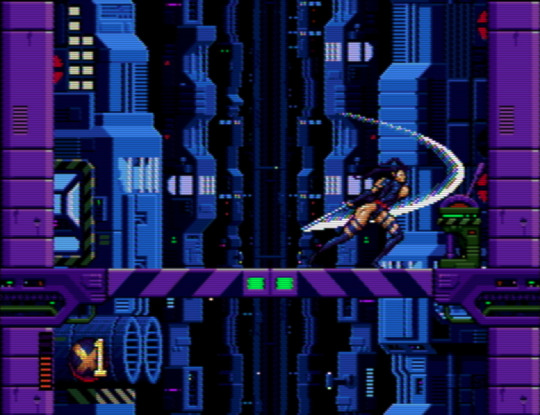

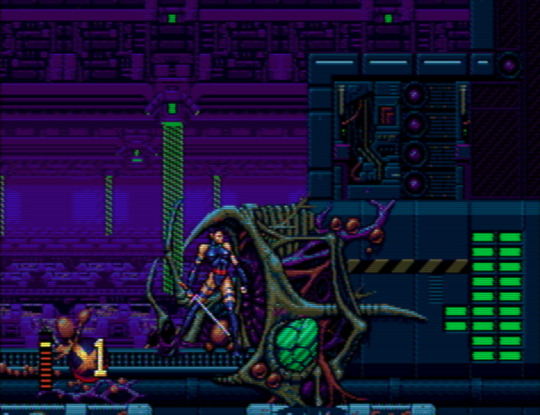
Although it might be an unfair association, when I think of Mega Drive action-platformers I think of hellishly large layouts featuring repeating level designs and little to no grounding setpieces. Now, there are numerous western-developed games for the Super Nintendo which fit this description, but as I had little experience with those growing up, aside from the occasional Bubsy or Marvin Missions, and as that was almost exclusively what I found when playing on someone else’s Genesis, it became a stereotype. Clone Wars doesn’t escape that sort of level design -- there’s a lot of impossible-to-anticipate enemy placement, some stretches where the visual homogeneity of your surroundings gives rise to the boring sort of dislocation, a few places that could be trimmed -- but it’s also better than I was expecting. Prior to starting a stage, you can choose from, ultimately, a total of seven characters. Aside from the last few stages, where it seemed practically necessary to choose Beast for his sheer strength, I could keep switching to a different character and not feel like I was inconveniencing myself for variety's sake. Perhaps because it was a late Mega Drive release, but also certainly because of the combined talents of the background artists who included Steven A. Ross (an artist for Chakan: The Forever Man), Clone Wars is hardly ever dull to look at. It harnesses that almost over-detailed, modular aesthetic many superhero comics came to have during the 90s: characters with too many muscles, machines with too many tubes, all of those melodramatic grotesqueries that are an irresistible attractant when you’re an adolescent. And Kurt Harland’s forceful, metalized score is the best audio accompaniment that you could wish for, maybe occupying the pinnacle of EDM/IDM on the system, right next to Bare Knuckle 3. I’d love to see a ROM-hack of this that adjusted the level design, or lessened damage taken.
6 notes
·
View notes
Text
Fireproof // Part One
(Authors Note: Here goes nothing.)
Summary: Supernatural Half Blood Boarding School AU where students are paired with a human counterpart to help them adapt to the human world outside their supernatural communities.
Highland Park Academy of Adaptation was a school unlike any other. It was a school for young adults from supernatural and human blended backgrounds to learn to blend in with the human world around them. Highland Park had students from many backgrounds such as, werewolves, vampires, fairies, orcs, giants, trolls, shapeshifters and the like. You name it, someone at the academy has probably been through there. These young adults live their lives among their families culture and go to schools within their cultural division. When they graduate their twelfth year of school they go to an Academy of Adaptation where they learn how to be more human like to blend in with the humans around the world. It’s a year long attendance and then they graduate, assuming they have passed their classes and tests. For many, this year is a breeze and they have no problem adapting because they’ve already lived with or among their human halves of their families. Other have a harder time because they have only lived with their supernatural parent or with their supernatural parent's families.
At Highland every student is paired with a human partner. They are usually around the same age and have been trained in helping specific supernatural cultures learn to blend and adapt. The student and their partner share a dorm room and learn from each other throughout the year. If a partner is successful, their student will graduate and leave the academy being able to fit seamlessly into human society. If they are not, well, they will be reevaluated as a partner and the student will have to attend another year with a new partner.
So here you are, standing in the main hall of Highland Park Academy awaiting your first ever student. You were new to the program, having just completed your two year long courses on werewolves and shapeshifters. You were ready to start your new job as a partner. You and all the students and other partners were stood around waiting for the school’s director, Mrs. Cooper, to announce the pairings.
Looking around you can see several werewolves, their bright eyes and sharp teeth showing every time they laugh. There is a fairy girl with literally glowing skin, she’s short and looks like she may be of asian descent. She’s quite beautiful and you think she will probably have no problem adapting. There are a few giant half bloods, they’re huge guys, well over six feet tall and built like...well..giants. It’s quite a mix and you’re excited to see which werewolf or shape shifter you get. Personally, you hope you get a shapeshifter because you had learned they were the easiest to help along at the academy. They could literally just look like a human and that was all they really needed to change. They usually grew up with all human families anyways.
There is a tall guy a few feet from you who has on a hoodie that is obviously too large for him and baggy cargo pants that look like they have to be held on with a belt they’re so big. He looks human in the face and eyes, from what you can see. He looks pretty cute. He’s got a mess of dark wavy loose curls and a look on his face like he didn’t want to be there though. You can’t decide if he’s a partner or a student. He didn’t have the body type of a shapeshifter and he was tall but no giant. He must be a partner you decide and look over to where Mrs. Cooper was walking into the room with her clipboard. She’s a short woman with olive skin, in her mid forties you would guess. Her hair is up in a bun and she has round glasses perched upon the end of her nose.
“Greetings students and partners! We’re ready for an exciting new year here at Highland and we know each and every one of you will bring honor and pride to our school. Let’s begin!” she says with a huge smile and you can feel the warmth radiate from her as a person. “Alan Wolfsbane and Jacob Turner, you will be our first pair.”
Two guys step forward and Alan is very obviously a werewolf. Jacob looks excited to meet him. They shake hands and introduce themselves briefly before heading for the banquet room doors to the right of the main hall. The names continue to be read and like Alan and Jacob, most of the pairs greet each other and head for the banquet hall. A couple of new girls -you recognize them from the school you attended to become a partner- burst into tears upon finding out their student assignment because they had obviously hoped for their other supernatural major, everyone had to have two.
There are only a few of you left standing around by the time your name is called. There is you, a giant, a pretty werewolf girl, the tall cute guy you couldn’t decide on what he was, and two other students that looked as human as you. So...one of them was not human. It was killing you, trying to sort out which of the guys around you weren’t but that didn’t last long at all. The school director was calling your name and you looked up to where she was standing as she announced your student’s name. “...and Shawn Mendes, you’ll be paired together.”
You look between the two obviously not humans and they make no signs of moving toward you. You turn, catching a glimpse of movement from the corner of your eye. It’s the tall cute guy in the over sized clothes. “I’m Shawn,” he says in a soft voice but doesn’t extend his hand. You extend yours but he just looks at it. Alright. First impression was going great. You introduce yourself and he starts walking with you to the banquet room.
“How old are you?” you ask, staring at the floor as you walk. He really didn’t seem interested in you at all.
“I’m 19. You?”
“I’m 19 as well.” You stop just inside the doors and bite your lip. “Um, I don’t mean to sound rude, but what are you?” You dare to look up at him, he’s almost a foot taller than you. He is still scowling a little. “I-I mean I just can’t tell from looking at you. I’m trained in werewolves and shapeshifters and you don’t have typical characteristics of either of them so I was just wond-”
“I’m not a werewolf or a shapeshifter.”
“W-what?” You look back into the main hall where Mrs. Cooper is assigning the last two pairs and the werewolf girl and her partner pass you and Shawn on their way in. “I’m not trained for anything else. There has to be a mistake. Shawn, what are you?”
Shawn shifts his weight uncomfortably. He comes off nervous, shy, maybe even insecure. He casts his eyes down, looking away from you as he says, “I’m uh, I’m a dragon half blood.”
A what? An excuse me? A dragon half blood? No one has seen one in years, decades and he just happens to be one? This was a mistake. Surely Mrs. Cooper read your name wrong. You did not train for this. You take a step back from Shawn and turn to Mrs. Cooper as she walks into the banquet hall. “Ma’am, I think there is a mistake. I’m not trained for a dragonborn student.”
She look Shawn over and smiles softly. “Dear, no one is. Unfortunately we had already sorted all the pairs and you and Shawn were the last to be added to the roster. You’ll do just fine, dragons are supposed to be similar in traits to werewolves. I believe in you, dear.”
Dragons were not like werewolves. Not even close. You find yourself standing in the middle of your dorm room with Shawn on the other side of the room pushing his bed towards yours. The two of you had opened the door to the dorm and he dropped his bags, put his arms up in the air and said, “This is not gonna work!” To what, you had no idea until you asked what he was talking about. That’s when he said the beds were the problem. Your first thought was that his bed was too small? In which it might actually be, because he was pretty big. But no, he didn’t mean his bed was too small. He meant the fact that there were two beds, was not going to work.
Your initial reaction was to say no way were you going to share a giant bed with him and you told him as such. But when he explained to you that he had never slept alone before and was used to sharing a bed with someone or something, namely his dogs or his best friend back home, you felt bad for him. He had looked so genuinely upset and hurt that you wouldn’t share a bed with him. Eventually you caved, deciding it wasn’t the end of the world if you slept close to him. You would just have to adjust.
So here you are, standing in the middle of the room while Shawn slides the two twin size beds together. They fit surprisingly well and there's almost no gap between the mattresses where the bedframes touched. Shawn stretches his arms up and you catch a glimpse of something along his hip bones that was dark and uneven. Birth marks? Tattoos? You don’t ask about it.
It takes a while but you get everything unpacked and put away for the year. Shawn has way less to unpack and he takes a nap, curled up in his blanket on the bed while you sort your books and personal belongings.
Shawn must have woken up sometime after you went into the attached bathroom to put away your shampoo and blow dryer because when you open the door to the bathroom you are met with the sight of Shawn’s back. He’s shirtless, clearly very fit and you wonder for a second why he had been wearing such large baggy clothes. You don’t wonder for long, maybe a second or two before you register that he had scales, yes, dragon scales running up his spine to his neck. They were faded against his skin, almost looking as if the skin had ‘rubbed’ away and revealed the scaled below. But that wasn’t what really caught you off guard. No. Scales were nothing compared to the tail he had. That’s right. A tail. A long, thick at the base where it was connected to his lower back, dragon like tail. You do a double take. A triple take. Shit, you have to rub your eyes you are so shocked.
“You have a tail?!” you blurt out and he whips around, putting his hands behind him as if to cover his tail? There was no covering that up. You had so many questions. Where did he hide that earlier? How did he hide that? Is that why he had on the two or three sizes too large clothes? How were you supposed to help him adapt to the human world when he had a fucking tail?!
Shawn pushes past you and into the bathroom where he closes the door a little too loudly. He seemed embarrassed that you’d said something. In fairness, you had kind of yelled it at him in a ‘wow look at that thing’ type of way. You leave him be in the bathroom, assuming he will come out when he’s ready. Several minutes pass and he doesn’t come out. It’s after your usual bedtime and you are sick of waiting, an hour has passed and he didn’t so much as make a peep. You get in bed and curl up facing the wall opposite the bathroom door.
You’re almost asleep when Shawn comes out and you don’t turn around to look at him. The bed shifts as he gets in on his side and you can feel him shifting around to get comfortable. Eventually you roll onto your back with your hands at your sides and his hand finds yours in the dark room. Your first instinct is to pull it away but he goes for it again and you let him hold your hand. It’s the least you could do after clearly upsetting him earlier.
“Please don’t point out my tail like that,” he says softly into the silent darkness filled room
“I’m sorry,” you whisper in response. You really were. He had hidden in the bathroom for over an hour. You knew what it was like to have someone point out your insecurities. It hurt. You would never have said anything if you had known it would upset him.
“It’s just...I know it’s obvious but I hate it. I don’t think I’m going to do good here.” Shawn’s voice is a little broken as he says this. As if he were about to cry. It’s heart breaking. “I want to go home.”
“Shawn, it’s not even the first day. Don’t quit on me now.” You give his hand a little squeeze and he squeezes back. Clearly his tail was a huge problem for him and while you couldn’t relate, you could help him accept it. “We can talk more in the morning. You’re just nervous probably.”
His voice breaks as he says, “Y-yeah. I am. I’ve never been away from my community before now. I didn’t hate my tail until I was told I would have to come here and pretend to be a human. How am I supposed to blend in like this?”
“You’ll be fine. I promise. You have me, and it’s my job to help you adapt, remember?” He hums in response and you lay in silence a while longer until the two of you fall asleep.
#shawn mendes fluff#shawn mendes fic#shawn mendes au#shawn mendes writing#Shawn Mendes Imagine#my fic#fireproof
767 notes
·
View notes
Text
Nansook Hong – In the Shadow of the Moons book, part 6
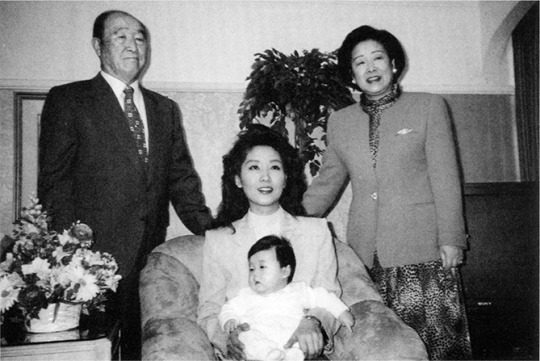
Six months before I fled the Moon compound, I posed with True Mother and True Father on the 100th Day anniversary of Shin Hoon’s birth. Because his drinking and drug use left Hyo Jin in no condition to participate, we went without the traditional 100th Day celebration.
In The Shadow Of The Moons: My Life In The Reverend Sun Myung Moon’s Family by Nansook Hong 1998
Chapter 10
page 207
My children had insisted that all they wanted was a little house they could call their own. That’s what they got. We moved into a modest split-level in an unpretentious neighborhood of Lexington, Massachusetts, the birthplace of the American Revolution. It seemed like a fitting place to begin my new life. Like the Minuteman whose statue dominates the town green, I, too, had declared my independence from an oppressor.
There is no freedom, though, without security. At my lawyers’ urging, the first thing I did when we reached Massachusetts was file a request with the court for an order of protection to prohibit Hyo Jin from having any contact with me. I could imagine his fury when he had awakened and found us gone. I wanted to do what I could to discourage him from trying to find us.
In my affidavit filed with the Massachusetts probate court, I tried to explain that this was not a typical domestic violence case. I was afraid not only of my husband but of the powerful religious cult that sheltered him. Attempts by any member to break away from the Unification Church are fiercely resisted. What would Sun Myung Moon and his minions do to get his daughter-in-law and five grandchildren back behind the iron gates of East Garden?
The entire legal procedure was intimidating for me, but my fears were eased by the Boston lawyers I had hired with the help of my brother. Ailsa Deitmeyer, an associate in the firm, was especially reassuring, perhaps because she is a woman, perhaps because she is graced with a compassionate heart. She made me feel safe at last.
The court impounded my new address to thwart any efforts by my husband and the Unification Church to contact me. I knew, however, that it was only a matter of time before they learned where I was living. I was a woman with five children, without resources. Where would I go? The Moons eventually would figure out that I had come to my brother; it would not be long before they found me.
I knew that a court order was just a piece of paper, but I thought it might be enough to discourage the Moons from any ideas about taking my children by force. How many custody cases, in circumstances far less bizarre than mine, involve the kidnapping of children?
Standing in the dingy courtroom in Cambridge, I looked past the peeling paint and battered benches. My eyes focused on the American flag. I thanked God I was in America. That flag was protecting me, a Korean girl who had come to this country illegally, who was not yet a citizen. Of all Sun Myung Moon’s sins, I thought, his attacks on America were the most vile. He was rich and powerful; I was neither, but we were equal before that flag. The scales would not have been so balanced in my homeland. For me, on that summer day, the United States meant freedom. The stars and stripes were the most beautiful sight I had ever seen.
After helping me unload the cars, Madelene returned immediately to New York and her job at Manhattan Center in order not to arouse suspicion. Hyo Jin had not guessed her role in our escape. He called her every day to ask if she had heard from me. He ordered her to hire a private investigator with Manhattan Center funds to find me, an order she ignored. When I had not returned or contacted Hyo Jin after a few days, the focus of his demands on Madelene changed.
In a telephone conversation that she recorded, Hyo Jin told Madelene to meet him at the corner of 125th Street and Riverside Drive in Harlem with enough money for him to score some crack cocaine. “I just want to numb this feeling, just do the crack. At least when I do it, I can get lost in it. Maddie, I’m sorry, but I have no other choice. I can’t deal with these feelings. . . . I don’t want to ask anybody else. Come on, Maddie. Do this one for me. Come on. . . . I’ve got nothing to lose, Madelene. O.K.?”
The next day Madelene drove Hyo Jin to the airport for his trip to a drug treatment program at the Hazelden Clinic in West Palm Beach, Florida. He spent the ride detailing to Madelene the torture he would subject me to if he ever found me. He described graphically how he would peel off my skin and pull out my toenails. I had good reason to be afraid of him.
He lasted at Hazelden only a few days before doctors asked him to leave, citing his lack of cooperation. The Moons sent him next to California to the Betty Ford Clinic, where he remained for more than a month in their detoxification program. It had taken the loss of his wife and children to force Hyo Jin Moon and his parents to address his addiction to alcohol and cocaine. I knew they would expect me to be heartened by this development, but I knew Hyo Jin too well. He would do what he had to do to appease his parents, but I had little faith that whatever level of sobriety he reached in confinement could be sustained once he returned to East Garden.
My children and I, on the other hand, were drunk on our new freedom. Our house was cramped, our sleeping quarters tight, but we were together, out of the shadow of the Moons. The kitchen was especially small, although that was not an immediate concern, since I did not know how to cook. Meal preparation was one of so many domestic chores I had never learned to do. The staff at East Garden had met all of my daily needs for fourteen years. Chefs, launderers, housekeepers, hairdressers, nannies, plumbers, carpenters, auto mechanics, locksmiths, electricians, tailors, gardeners, dentists, doctors, and dozens of security guards were always on call. I did not know how to run a dishwasher, how to mow a lawn, how to operate a washing machine. The first time the toilet over-flowed, I called Madelene in New York in a panic.
It was a difficult adjustment for me, but it was harder still for my children, who had been treated since birth like princes and princesses. It was not easy for children accustomed to maid service to learn to hang up their clothes, to take out the trash, and to clean up their rooms, but they did. They learned to share bedrooms and wait to use our one bathroom. No longer part of the True Family, superior in status to their peers, they adapted to the new egalitarian realities of their lives and began to make friends as equals.
I had neither the money nor the inclination to send them to the kind of private schools they had attended in New York. Tuition for them the previous year had totaled fifty-six thousand dollars. If I was going to immerse my children in the real world, what better place to start than the public schools? Lexington is a comfortable suburb west of Boston with an excellent school system. I was grateful for that.
My children and I stumbled toward self-sufficiency together.
We had a lot to learn, but we were not alone. My sister and my brother and his wife helped and supported me. Having them close by meant not feeling afraid as we embarked on this new life. The children had their cousins and I had adults who understood the painful and awkward transition I was trying to make. The worries that disturbed my sleep were not the kind a friendly neighbor could easily relate to over a cup of tea.
I had timed our escape so that it would coincide as closely as possible with the start of the new school year. I knew the children would miss their friends, and I was eager for them to be able to make new ones as soon as possible. In September I enrolled Shin June in seventh grade. She would be the only one of my children at the middle school. She was the oldest and the most independent; I was confident that she would do well academically and socially. The other children would all attend the same neighborhood elementary school. The baby would keep me busy at home.
Their teachers reported few adjustment problems and I saw a house full of happy children. Their father had had so little to do with their lives in New York that it was no surprise to me that they felt only relief that he, as well as all the abuse he represented, was absent from their lives in Massachusetts. Shin June played the flute with a local wind ensemble. Shin Gil made friends easily but was very sensitive to being reprimanded, no matter how gently, by me or a teacher. His teacher reported taking him into the hall once when he seemed tearful to ask what was bothering him. “He told me he used to live in a mansion,” she reported. “Now there isn’t much privacy and there isn’t as much to do. He misses his friends. I asked about his dad. He said that once in a while he misses his dad but that his dad was a drunk who yelled a lot.”
Not surprisingly, the first pressure the Moons applied to force us back to East Garden was financial. What savings I had covered our food and basic necessities. My paycheck from Manhattan Center made the difference between being able to pay the monthly mortgage and not. My lawyers had been assured by attorneys for Hyo Jin that those checks would continue to be issued to me until we worked out a temporary child-support arrangement through the probate court.
They weren’t. My lawyers filed a formal request with the court for child support. “It appears Ms. Moon’s check will be withheld, perhaps trying to force her back into an abusive relationship,” my lawyers wrote to church representatives. “Ms. Moon’s decision to seek safety from a horrendously dangerous situation was not reached lightly. Having made the decision, however, she is determined not to return, regardless.”
With my brother’s and sister’s help, I had hired Choate, Hall and Stewart, one of Boston’s finest firms, to represent me in what I anticipated would be a protracted divorce case. We knew I would need the best lawyers in the city if I was going to take on the Moons. Like so many women facing divorce, I had no idea how I would pay my lawyers. In a study on gender bias in the courts in 1989, the Massachusetts Supreme Judicial Court had concluded that “there is too little legal help available to moderate income women, in part because judges fail to award adequate counsel fees, especially during the pendency of litigation.”
My chief lawyers were a brilliant Boston Brahmin named Weld S. Henshaw and his skilled and empathetic associate Ailsa De Prada Deitmeyer. They were confident that the court would require Hyo Jin to pay my legal bills. As experienced as he was, Weld conceded he had never encountered a divorce case quite like mine. Hyo Jin Moon was not the typical defendant; determining his real assets would not be a simple matter.
Hyo Jin retained law firms in New York and Massachusetts, including the Manhattan firm of Levy, Gutman, Goldberg and Kaplan. Gutman was Jeremiah S. Gutman, the former head of the New York Civil Liberties Union, the man who had championed Sun Myung Moon’s cause when he was convicted of tax evasion in 1982.
Our case was assigned to Massachusetts probate court judge Edward Ginsburg. He was a fair-minded gentleman, nearing retirement, who ran his Concord probate courtroom in a firm but folksy manner. Something of an eccentric, Judge Ginsburg was easy to spot arriving for work on summer mornings. He was the fellow in the blue seersucker suit with the yappy blond poodle on a leash. His dog, Pumpkin, accompanied the judge to the courthouse every day.
No sooner had I asked the court to require Hyo Jin to support his children than I heard from the Moons directly. Money was a great motivator. In Jin sent a letter through my attorneys to urge me to drop my legal action and come home. She enclosed an audio tape from Mrs. Moon, making the same plea.
It was startling to hear Mrs. Moon’s voice in my new surroundings. She could not hide her anger, but she made attempts to sound caring and to be distraught at my departure. The True Family needed to be intact. The bottom line, as always, was that I was at fault. “Nansook, your behavior is not acceptable to all the people who love you.” She predicted that I would be condemned by many people in the future and urged me to return “. . . without being changed.”
It struck me, as it always had, how selective the Moons could be when applying the teachings of the Divine Principle. No one lived her belief in forgiveness more openly than I. Hadn’t I forgiven Hyo Jin when he left me for another woman weeks after our wedding? Hadn’t I forgiven Hyo Jin when he gave me herpes? Hadn’t I forgiven Hyo Jin when he took up with prostitutes? Hadn’t I forgiven Hyo Jin when he squandered hundreds of thousands of dollars that had been intended for our children’s futures? Hadn’t I forgiven Hyo Jin when he beat me and spat upon me? Hadn’t I forgiven Hyo Jin when he abandoned me and our children for a life of drug and alcohol abuse? Hadn’t I forgiven Hyo Jin when he took a lover on the day I brought our newborn son home from the hospital?
I was not the one who had failed to consider the consequences of my actions. I had spent fourteen years refusing to entertain the idea that I could leave Hyo Jin Moon, that I could make a claim to a life free of fear and violence. I had not left East Garden precipitously. I had tried mightily to make my marriage work. Had the Moons ever thought that it was them, not I, who could be wrong?
In Jin’s letter was similar to Mrs. Moon’s tape in its judgmental tone. She expressed sympathy for my situation but scoffed at my seeking a restraining order against Hyo Jin, a man who had beaten, humiliated, and threatened me for fourteen years. She accused me of exaggerating the claims in my restraining order that I feared for my life. But her major point was apparently to try and convince me not to use the legal system against the Moons.
She hinted that it would be easy to attribute dark motives to my decision to leave. “Some have even commented that you left your husband after all these years only because he had lost his job and his position in the family,” she wrote. I could only convince the family of my good intentions by returning and helping Hyo Jin confront and conquer his alcoholism and drug abuse. “You are hurting everyone who loves you by using the legal system to get what you want,” she said, describing the system as “adversarial” and the end result as hurt for everyone.
It was impossible for the Moons to understand that I had already been hurt. I did not want a reconciliation; I wanted release from the abuse of a violent husband and the hold of a religion that had already consumed twenty-nine years of my life. I had never felt a stronger presence of God in my life than at the moment when I decided to flee East Garden. He had lifted the veil from my eyes; I was seeing clearly for the first time. I would never go back.
On October 25, the court ordered Hyo Jin to make monthly support payments for the children and appointed a social worker, Mary Lou Kaufman, to investigate whether visits with their father were in the best interests of our children. I did not want to deprive my children of contact with either their dad or their grandparents. However problematic the relationship, there was no question in my mind that children deserve two parents and two sets of grandparents. I knew that Hyo Jin loved our children, as much as a man as self-absorbed as he could love anyone. However, I urged Ms. Kaufman not to permit visits until the children were more settled and there was demonstrable evidence that Hyo Jin had stopped abusing drugs and alcohol.
I was especially adamant about confirming his sobriety. Hyo Jin prided himself on his ability to circumvent the law. He had once substituted a sample of Shin Gil’s urine for his own during a drug test mandated by his drunken driving conviction in New York. It was also noteworthy to me that Hyo Jin had not even asked to see his children until after I applied for financial support.
Ms. Kaufman met Hyo Jin in her office for more than four hours over two days in November. In her report to the court, she noted that he was anxious and highly agitated. He had a dry mouth and was hyperventilating. She suspected he was high on cocaine. He laced his speech with obscenities. He told her that my parents were behind the divorce effort, that my mother had proclaimed herself the Messiah, and that my parents intended to use whatever money I got in a divorce settlement to establish their own church in Korea. He brought my uncle, Soon Yoo, to support this cockamamy theory. Soon, who had been instrumental in my mother’s joining the church, betrayed her to improve his position with the Moons.
Hyo Jin insisted to Ms. Kaufman that he had always been an involved and active father, but he could not tell her the ages of our children or what grades they were in at school. He insisted that if they were not clamoring to see him, it was only because I had poisoned their minds against him. He was shocked to hear that Shin Gil had asked for a picture not of his dad but of one of his toys.
She concluded in her report in early December that no visitation should be allowed between Hyo Jin and the children until Hyo Jin had demonstrated that he had been free of drugs and alcohol for a two-month period.
The children and I were busy preparing for our first Christmas in our new home. My parents were coming from Korea. It had been years since we had all been together. Our reunion would be a celebration of our freedom as well. We decorated the house with the children’s drawings from school and a six-foot Christmas tree.
The Saturday before Christmas, I responded to a deliveryman’s knock at the front door. My heart raced as I accepted a package with a familiar return address. Hyo Jin had found us. I tried to conceal my concern from my parents and my children, but I had become less adept at disguising my emotions since leaving the Moon compound. The package contained several small Christmas gifts for the children and a card addressed to me in Korean. In it, Hyo Jin alluded to my revelations about his substance-abuse problems in court documents and asked how I would feel if my own “nakedness” were exposed to the world. It was a veiled threat to expose a videotape he had made of me in the nude.
My father, noticing my distress, tried to comfort me. “Don’t let him get to you,” my father advised. “If you’re down, he’s succeeded in his goal to hurt you.” He was right. I had done nothing wrong. Hyo Jin had. His letter was a criminal violation of the restraining order that prohibited him from contacting me. The son of Sun Myung Moon still thought he was above the law. I reported the threat to the police. Hyo Jin was charged with a criminal offense.
Through my attorneys, Hyo Jin sent letters to the children, expressing his love for them and his desire to see them. He could not resist criticizing me, however. In his letter to Shin June, he wrote: “Of course I feel angry at times at your mother but I want to forgive her. There are a lot of things you don’t know about your mother but that’s not important. You know why? It is because I want you to be a loving person who can love someone forever and not give up on the person that you love and also learn to forgive them as they face trials that life will offer, as it offers to everyone.”
To Shin Ok he wrote that he knew she loved him. “If there was no one telling you how bad Dad is I truly think you would never think even for the moment that way. You know what? Even if you think Dad is bad I feel OK because I won’t be bad any more.”
He promised all the children that he would write to them again soon but he never did.
In February 1996 Hyo Jin met again with Ms. Kaufman to assess the wisdom of allowing visits with the children. He was outraged that he had been barred from seeing them for so long. He talked about the revenge he would seek against me in court. He told Ms. Kaufman he would hire “a cutthroat legal firm from New York” to ruin me financially. He was attending meetings of Alcoholics Anonymous, he said, and was now committed to a life of sobriety.
Ms. Kaufman granted supervised visits with the children that spring. Hyo Jin saw his children only twice before the man who insisted he had changed forever failed a drug test. Visits were suspended until Hyo Jin could prove to the court’s satisfaction that he was no longer abusing drugs or alcohol. That day still has not come.
For all his accusations of being denied contact with his children, Hyo Jin has made no effort to stay in touch with them. His letters, to be delivered through my attorneys, were encouraged by the court, but he never wrote to them. He does not send them cards or gifts on their birthdays or at Christmas. He does not inquire how they are doing in school.
As troubling as their memories of their father are, his abandonment of them is painful for our children. Shin Gil, the favored son now living on my limited income, especially remembers how his father indulged him at video arcades and with expensive toys. Shin Hoon, the baby who never knew his father, wonders where he is. When I take him to nursery school, he often asks, “When is my daddy going to pick me up like the other kids’?”
Divorce is never easy for children, but for a man who claims to be part of the True Family, the embodiment of traditional moral values, Hyo Jin Moon has made it much more difficult for our children than it needed to be.
The Moons did not always pay the court-ordered child support. When they did, the check always came late and only after reminders from my lawyers, who were billing me for more hours than I could ever hope to pay. I had to sell some of my jewelry one month to pay routine expenses. Hyo Jin’s position was that he could not pay my legal bills because he had no source of income. He had been fired from Manhattan Center and cut off from the True Family Trust. He asked the court to believe that the son of one of the wealthiest men in the world was destitute.
Judge Ginsburg was not buying it. The lines between Unification Church funds and Moon family money and Hyo Jin Moon’s finances were imaginary. Hyo Jin had access to limitless funds while reporting few assets and only modest income. In terms of housing, travel, cars, private schools, and servants, he and his siblings lived without any budgetary constraint. For Hyo Jin to argue that he had no money because he was unemployed was to ignore the fact that his employment at Manhattan Center Studios had been no more independent of his father than his living arrangements. His father housed him, fed him, and employed him. Take away the Unification Church and the uneducated Hyo Jin Moon was unemployable. It was laughable to suggest that whatever assets he had, and he claimed he had few, had been acquired in any way other than through the largesse of Sun Myung Moon.
To maintain the fiction that Hyo Jin was destitute, one had to ignore that all his income led back to the same source: Sun Myung Moon. Noting the fine cut of the suits being worn by the army of attorneys from Boston and New York who accompanied Hyo Jin Moon to court, Judge Ginsburg ordered him to pay my counsel fees or face arrest for contempt of court.
The Moons would not pay. That summer Sun Myung Moon sponsored an international conference in Washington, D.C., to discuss how to restore traditional family values. The irony was almost too rich. Hyo Jin Moon could not attend the two-day symposium in the Great Hall of the National Building Museum to hear speakers such as former presidents Gerald Ford and George Bush, former British prime minister Edward Heath, former Costa Rican president and Nobel Peace Prize winner Oscar Arias, and Republican presidential hopeful Jack Kemp address the erosion of family values around the world. Sun Myung Moon’s son was languishing in a Massachusetts jail cell, where Judge Ginsburg had sent him for defying his order to pay my legal bills. He would remain there for three months, winning his release only after he formally filed for bankruptcy in New York State to prove that he was a man without financial resources.
Money became a constant source of worry for me. What if the Moons did not send the check? What if my lawyers got tired of waiting to be paid? How would I care for my children? I had an undergraduate degree in art history. I wasn’t qualified to do anything more than volunteer as a tour guide at the Boston Museum of fine Arts. That would not pay the dental bills for five children. In my desperation, I applied for a sales position at Macy’s department store at the local shopping mall. I completed the training course by asking my sister and Madelene to baby-sit. Madelene had left the church one month after I did and moved close by. I could not have gotten through my first year of freedom without her and my sister and brother. Only when I was trained did I learn that Macy’s expected me to work every weekend. How could I? Who would watch my children? I returned home, feeling defeated.
Independence has its price. I needed to settle my divorce case and move on with my life. I would need more education if I was going to land a job that would allow me to give my children the advantages they deserved, advantages their cousins in East Garden took for granted.
Through my attorneys, I proposed a divorce settlement that would sever my ties forever to the family of Sun Myung Moon. I asked that trust funds be established for me and for my children from which I would pay for our health insurance, education, clothing, housing, and all other expenses. There would be no alimony and no child support. I would pay my own legal fees. My lawyers summarized my intentions in the proposal:
“The concept of a trust such as this would insure there was no likelihood of these assets being dissipated so that the settlement could truly be finished now and forever with no second chances.”
Sun Myung Moon refused. He was firm that Hyo Jin’s financial situation was independent from his own. He would not take responsibility for the future well-being of his grand-children. In addition, the Moons demanded that the terms of any divorce agreement remain confidential. They did not want me to talk. I refused all demands for confidentiality.
In a deposition filed with the court in July 1997, Sun Myung Moon made his position clear.
When my son, Hyo Jin Moon, was cut off as a beneficiary of the True Family Trust and was discharged from his position as an employee, officer and director of Manhattan Center Studios, Inc. and was subsequently discontinued from his status as a disabled employee receiving disability payments from Manhattan Center Studios, Inc. my concern and love for his five children, my grandchildren, moved me to provide support funds fixed by order of the court in Massachusetts having jurisdiction of the dispute between my son and his wife.
My son, Hyo Jin Moon, had and has no control over whether I choose each month to make and continue to make such payments. They are voluntarily made by me so long as I am able and willing to do so.
Negotiations have broken down and I now learn that my daughter-in-law is making efforts to re-incarcerate my son, despite the fact that he has no assets or income other than a $3,500 gross salary per month from his re-employment by Manhattan Center Studios, Inc. I am re-thinking the situation.
The implied threat, that if I did not settle on the Moons’ terms, child support payments would be cut off, was not subtle. The Reverend Moon paid fifty-thousand dollars toward my counsel fees to keep his son out of jail, not out of respect for the court that ordered the bills paid.
“I am pleased that Hyo Jin Moon has recovered sufficiently to resume his productivity as a producer of musical recordings and I hope he will be able to continue to be artistically creative and productive and to earn sufficiently so that I can discontinue supporting him as I have consistently done since he was cut off from all income,” the Reverend Moon said, still ignoring the reality that Hyo Jin’s job only existed because his father created it.
Our divorce case had produced enough paper to make a stack of legal documents two feet high. It had dragged on for two and one-half years. Sun Myung Moon had displayed more willingness to pay hundreds of thousands of dollars to lawyers than to guarantee the future security of his grandchildren. So much for family values.
In December 1997 I settled for a token lump sum payment and a continuation of monthly child support. If we were dependent on monthly support payments, I knew we would forever be at the mercy of the Moons. Once the litigation had ended, Sun Myung Moon could cut off the money at any time. I could not imagine a more likely candidate for a “deadbeat Dad” than Hyo Jin Moon.
Still, I wanted this to be over. I was tired. My attorneys had fought hard and done the best they could for me. I could not have asked for better counsel. How many other women in protracted divorce fights felt just as I did: he with the most resources wins? There would be no alimony, no compensation for the fourteen lost years of my life. There would be no trust fund to ensure that my children had access to a college education. If the children wanted money for schooling, Hyo Jin’s attorneys told my own, they would have to come to Sun Myung Moon personally and ask their grandfather.
I did not oppose supervised visitation by Sun Myung Moon and Hak Ja Han Moon, but I was skeptical that they were sincere in this demand. In the two and one-half years that had passed since we fled East Garden, they had not written or called their grandchildren once. They had not remembered them at Christmas or on their birthdays. They had displayed the same indifference to them as had their son.
At 9:15 A.M. on a cold, sunny December morning, I stood across from Hyo Jin Moon in the well of a small courtroom in Concord, Massachusetts. I answered, “Yes, Your Honor,” when Judge Edward Ginsburg asked me if my marriage was beyond saving. Hyo Jin mumbled a disrespectful “Yeah” when asked the same question. Judge Ginsburg reminded us, as he did all divorcing couples, that marriages end but parenthood does not. He granted my request to legally restore my maiden name, and with the flick of a judge’s pen, the nightmare that was my marriage to the abusive son of a false Messiah was over at last.
No one had really won. Not me. Not Hyo Jin. Not our children. Only Sun Myung Moon had gotten what he wanted all along. My children and I had slipped out of the grasp of the Unification Church, but we were destined to remain in the shadow of the Moons.
Epilogue
The Messiah is seventy-eight years old. His claims of divinity notwithstanding, even Sun Myung Moon cannot live forever. When he dies there is every possibility that the Reverend Moon will take the Unification Church with him to his grave.
The Reverend Moon has made no concrete plans for his succession. To do so would require him to relinquish some power while he is still alive, and that prospect is inconceivable to a man accustomed to being the central figure in a tightly controlled universe. The Unification Church is a classic example of what psychologists call a cult of personality.
The failure to designate and groom a successor all but guarantees a familial bloodletting after the Reverend Moon’s death. His sons are already locked in a battle for control of his business empire. That struggle will only intensify when the Unification Church itself is up for grabs.
Leadership, of course, should fall naturally to the eldest son, but given Hyo Jin’s continuing problems with alcohol and drugs, his brothers are already jockeying for position. Even In Jin, who has no chance to succeed her father because she is a woman, is desperate to salvage Hyo Jin’s candidacy. She cast her lot with him a long time ago. If he goes down, she and Jin Sung Pak go down with him.
When he addresses the issue at all these days, the Reverend Moon implies that the True Mother will rule when he ascends into Heaven. No one in the church seriously believes that Hak Ja Han Moon is either capable of taking or inclined to take any more than a symbolic role at the helm of the Unification Church.
A month before I left East Garden, Mrs. Moon and I spoke about the future of the Unification Church. I urged her not to turn control over to Hyo Jin. I could not imagine a more unstable individual to lead a nominally religious enterprise. She reluctantly agreed that Sun Myung Moon might have to look to one of his other sons to lead the Unification Church. I know that possibility saddened her. Hyo Jin’s birth, after her first child was a daughter, had sealed her position as the True Mother. Her fate and his had seemed bound together.
The evil at the heart of the Unification Church is the hypocrisy and deceit of the Moons, a family that is all too human in its incredible level of dysfunction. To continue to promote the myth that the Moons are spiritually superior to the idealistic young people who are drawn to the church is a shameful deceit. Hyo Jin’s failings may be more conspicuous, but there is not a member of the second generation of Moons to whom the word pious could fairly be applied.
Sun Myung Moon wrote the epitaph for the Unification Church in a sermon in 1984 about the moral and spiritual decline of the United States. His words could better be applied to his own family. “Sodom and Gomorrah were destroyed by God’s judgment for the immorality and pursuit of luxury. Rome was in the same situation. It did not collapse from external invasion but from the weight of its own corruption.”
The Unification Church still claims millions of members worldwide. How many of those are active fund-raisers and participants in church affairs is another question. Unlike other religions, the Unification Church has few formal worship sites where attendance could be taken. Some cities have churches, others don’t.
Even many of the church training centers, where religious services and seminars were held, closed in the early 1990s during Sun Myung Moon’s disastrous experiment called home church. In response to the negative publicity about the public proselytizing of the Moonies, the Reverend Moon sent members home to convert their relatives and neighbors. Such decentralization, however, weakened the control the Reverend Moon maintained over his flock. Many members, re-exposed to the wider world and their families’ disapproval of Sun Myung Moon, just drifted away.
In the wake of that failure, the Reverend Moon and church leaders regrouped. In the last few years, they have orchestrated a remarkably successful campaign to win respectability and wield political influence. As usual, they have succeeded by deceitful means. The Unification Church has launched dozens of civic organizations around the world dedicated to women’s rights, world peace, and family values that have made impressive inroads into mainstream society. None of them advertise their relationship with Sun Myung Moon or the Unification Church.
The Women’s Federation for World Peace, the Family Federation for World Peace, the International Cultural Foundation, the Professors World Peace Academy, the Washington Institute for Values in Public Policy, the Summit Council for World Peace, the American Constitution Committee, and dozens of other organizations present themselves as nonpartisan, nondenominational groups. All of them are funded by Sun Myung Moon.
In March 1994 for instance, the Women’s Federation for World Peace sponsored a program “promoting peace and reconciliation” at the State University of New York campus in Purchase. Hyun Jin Moon, the Reverend Moon’s then twenty-five-year-old son, opened the event with a declaration that Sun Myung Moon had a new divine revelation for America. The organization had solicited a welcoming letter from Sandra Galef, the local state assemblywoman. She was never told the group was affiliated with Sun Myung Moon.
“I have never supported the Unification Church,” the angry assemblywoman later told the New York Times. “I have always felt they are a group that destroys families. If the individual who came into my office requesting a letter had honestly told me what this organization was, I never would have given it to them. Basically it was a hoax.”
The same month, the Toronto chapter of Women’s Federation for World Peace and the University of Toronto branch of CARP cosponsored an AIDS-prevention program for teenagers at North York Public Library. The promotional flyer invited parents to enroll their children to ensure that they “choose a lifestyle without disease and drugs.” Nowhere did it mention the Unification Church or Sun Myung Moon.
Some of the biggest celebrities in the United States have been seduced by exorbitant speaking fees to participate in programs sponsored by these groups without ever knowing their affiliation with the Moonies. Gerald Ford, the former president; Barbara Walters, the television journalist; Christopher Reeve, the actor; Sally Ride, the first American woman in space; Coretta Scott King, the civil rights leader; and Bill Cosby, the comedian, have all spoken at functions sponsored by the Women’s Federation for World Peace.
Perhaps the worst offenders have been former president George Bush and Barbara Bush. They do know the relationship between the Reverend Moon and these groups, and yet they were reportedly paid more than a million dollars in 1995 to address six rallies in Japan sponsored by the Women’s Federation for World Peace.
The former president is not naive. Certainly George Bush knows that when he hails Sun Myung Moon as “a visionary,” as he did in a speech in Buenos Aires in 1996, he is legitimizing the work of a man who uses manipulation and deceit to recruit cheap labor to work to finance his lavish lifestyle. President Bush was paid to attend a party with the Reverend Moon in Buenos Aires to launch Tiempos del Mundo, or the Times of the World, an eighty-page weekly Spanish-language tabloid newspaper distributed to seventeen countries in South America.
Every photograph of the Reverend Moon with a world political leader enhances his credibility. Pictures of Sun Myung Moon as an international religious leader get politicians like Argentina’s President Carlos Saul Menem to meet with him when he has no more than a few thousand followers in that country.
What influence the Reverend Moon does not wield through his political connections, he exercises through his financial investments in real estate, banking, and media. In Latin America alone, those holdings are valued at hundreds of millions of dollars.
Mainstream religious leaders in the heavily Catholic region have proved less than receptive to Sun Myung Moon’s recruitment efforts. “Deceptive proselytizing by institutions like the Unification Church are hurting the good faith of Christians of our country and other countries across Latin America,” a group of Catholic bishops in Uruguay said in a statement issued in 1996. “These organizations promote fundamental human values, but in reality they attempt to convert believers to their religious movement.”
The Unification Church’s biggest challenge in the years ahead will be holding on to Japan as the financial engine that runs this moneymaking machine. For decades Japan has been Sun Myung Moon’s strongest base of support and most reliable source of cash. However, fund-raising efforts there have begun to stall in the last few years in the wake of public complaints, lawsuits, and government scrutiny of church operations. The church claims to have 460,000 members in Japan, but critics say the figure is closer to 30,000, and that only 10,000 of those are active members.
The Reverend Moon founded the Washington Times in 1982 to counter what he charged was the liberal bias of the American press, especially the Washington Post. The Washington Times Corporation also publishes a weekly newsmagazine called Insight, also founded to parrot the Reverend Moon’s anti-Communist ideology. His timing was perfect; the Washington Times became a favorite publication of the conservative Republican president Ronald Reagan. Key Reagan administration officials often leaked information to its reporters. Although editors claim that both publications are independent of the Unification Church, the first editor and publisher of the Washington Times, James Whelan, was fired after he objected to the church’s interference.
With its marble columns, brass railings, and plush carpeting, the Washington Times headquarters looks like a more profitable operation than it is. The paper continues to lose money sixteen years after the first press run. It is subsidized by the profits of the Reverend Moon’s other business holdings and, increasingly, by “donations” from Japanese members.
At a dinner celebrating the tenth anniversary of the Washington Times in 1992, the Reverend Moon said he had invested close to a billion dollars in the paper in its first decade in order to make it “an instrument to save America and the world.” The Reverend Moon told the crowd at the Omni Shoreham Hotel in Washington that he founded the Times because “I believed it was the will of God” to have him run a newspaper with a mission of “saving the world from the collapse of traditional values, and to defend the free world from the threat of communism.”
That was the same year the Reverend Moon rescued the University of Bridgeport from bankruptcy, providing the Unification Church with a legitimate academic institution from which to mount its efforts to save the world. The Professors World Peace Academy, a Moonie front, has spent more than a hundred million dollars to keep the Connecticut university afloat. A group calling itself the Coalition of Concerned Citizens had opposed the Reverend Moon’s offer to bail out the university in exchange for a controlling number of seats on the board of trustees. The university community voted for survival. In the end, professors’ fears about the influence of the Moons on academic freedom were overwhelmed by their desire to save their jobs.
Trustees were willing to overlook the real source of the bailout to save their school, blithely accepting Sun Myung Moon’s assurances that the Unification Church itself would have no contact with the university. In 1997 the Unification Church made explicit its relationship with the University of Bridgeport by opening a boarding school on campus. New Eden Academy International serves forty-four high-school-age children of church members. Its headmaster is Hugh Spurgin, who has been a follower of Sun Myung Moon for twenty-nine years. His wife is the president of the Women’s Federation for World Peace, another Moonie front. University classrooms are being used by the high school for a full array of classes, including religious training. The students eat in the university’s dining halls and study in its library, but the boarding school still insists it is independent and merely renting space on campus.
City councilman William Finch, a leader of the Coalition of Concerned Citizens, was right when he told the New York Times: “It shows just how far the Unification Church has come in its efforts to be accepted by mainstream society, because nobody seems to care, or be bothered by this.”
Plenty of people are bothered by the Unification Church in Japan, however. Hundreds have sued, charging they were cheated out of their life savings by Unification Church members who promised that Sun Myung Moon’s intercession could save a deceased loved one from the fires of hell. Government consumer protection officials in Japan say they have received nearly twenty thousand complaints about the Unification Church since 1987. The church already has paid out millions to settle many of the lawsuits involving the sale of vases, icons, and paintings said to have supernatural powers.
The Unification Church has never had much religious appeal in the United States or in Europe. Its business holdings are extensive and the wealth generated by those enterprises is enormous. As a spiritual entity, however, the Unification Church has been something of a bust. The church claims to have fifty thousand members in the United States, but I would put the number of active members at no more than a few thousand in the United States and no more than a few hundred in England. Sun Myung Moon himself was banned from Britain in 1995 because the Home Office, which is in charge of immigration, declared his presence was “not conducive to the public good.” It isn’t as easy as it used to be to find impressionable young people willing to spend eighteen hours a day selling novelty items out of the back of a van to raise money for the Messiah.
The Reverend Moon hoped to find those recruits among the ranks of his old enemies, the Communists. In 1990 the Unification Church began a major recruitment and investment drive in the Soviet Union. Sun Myung Moon met in the Kremlin with President Mikhail Gorbachev and also invited a select group of Soviet journalists to his home in Seoul for his first interview in ten years. That same year, Bo Hi Pak, one of Moon’s top aides, led a delegation of businessmen from Korea, Japan, and the United States to Moscow to explore investment opportunities. Before leaving, Bo Hi Pak wrote a one hundred thousand dollar check to one of Raisa Gorbachev’s favorite cultural foundations.
The Reverend Moon’s efforts in Russia seemed to stall after the collapse of Communism and the breakup of the Soviet Union. His false start there was overshadowed by his disastrous investment in China. At the urging of Bo Hi Pak, the Reverend Moon invested $250 million to build an automobile plant in Huizhou in southern China. He promised to invest a billion dollars in Panda Motors Corporation to blanket the country with subcompact cars. The Reverend Moon claimed his goal was not to make a profit but to invest in poorer nations. His commitment to the development of mainland China disappeared when bureaucratic obstacles and poor planning slowed down progress on the plant. He soon abandoned the project and redoubled his efforts in South America, where church leaders think the future is brighter.
I have begun taking courses at the University of Massachusetts while my children are in school. I am studying psychology, perhaps motivated as much by a need to understand what happened to me as to prepare for a career helping others in emotional distress. I was a battered woman, but I was also part of a religious cult. I am in the process of trying to understand the decisions I did and did not make over the course of fourteen years.
One thing I have learned from experience: the mind is a complicated thing. Words like brainwashing and mind control are better suited to political than psychological discussions of the Unification Church. Catchphrases cannot fully explain the attraction of groups like the Moonies or the hold they have on their followers.
If I believed I had been brainwashed, I could escape the depression and self-flagellation that have accompanied my new freedom. I do not yet fully understand how I remained blind for so long to the charlatan in Sun Myung Moon. My experience was different from that of recruited members. I was not deprived of sleep or food, subjected to hours of indoctrinating lectures, or separated from my family. I was born into this religion. My parents were steeped in the traditions and beliefs of a church that dictated where they lived, what work they did, and with whom they associated. I knew nothing else.
I feel duped, but I do not feel bitter. I feel used, but I feel more sad than angry. I long to have the years back that I lost to Sun Myung Moon. I wish I could be a girl again. I wonder if I will ever know romantic love, if I will ever trust a man or any so-called leader again.
In many ways I am a thirty-year-old woman experiencing a delayed adolescence. I am learning along with my fifteen-year-old daughter about independence, rebellion, fashion, peer pressure, personal responsibility. I am sometimes overwhelmed by my responsibilities, but I savor the freedom I now have to make my own choices. I am in control of my life. There is no more liberating feeling in the world. For the first time, I have a sense of real happiness. I have a renewed sense of energy as I pursue my studies and my volunteer work at a shelter for battered women. I have discovered with satisfaction that I have a contribution to make to my community, as well as to my children.
There is an old Korean proverb: Blame yourself, not the river, if you fall into the water. For the first time in my life, that dictum makes sense to me. I, alone, am in charge of my life. I, alone, am responsible for my actions and for the decisions I make. It is terrifying. I spent half of my lifetime ceding all decisions to a “higher authority.” Learning to make decisions for myself means being willing to accept the consequences — the bad ones as well as the good ones.
I spend a lot of time explaining that principle to my children these days. I know the time could come when one of them will tell me that he or she wants to go back to the Unification Church. As Hyo Jin Moon’s eldest son, Shin Gil, I know, will one day be subjected to enormous pressure to return. On the jacket cover of the latest compact disc by his new band, the Apocalypse, Hyo Jin has used a photograph of himself with Shin Gil. The title of the album is Hold on to Your Love.
I pray that neither Shin Gil nor any of his siblings will be lured back to East Garden as adults. If they are, I will be saddened but accepting. I hope I will have taught them to make thoughtful, informed choices. I hope I will have taught them not to be swayed by the temptation of money or the illusion of power. I hope I will have taught them that we all must work for what we want in life; that unless we earn something, it is not really ours; that if something seems too good to be true, it probably is.
I will always love my children, no matter what their choices, just as I have always loved my parents, no matter my regret about some of theirs. I hope my relationship with my children will always be open and honest enough to allow us to disagree without those disagreements coming between us. That is real love, not marching in lockstep behind any Messiah.
I admit to some cynicism these days about organized religion. Those who see dangers only in “cults” ignore how fine the line is between the religious mainstream and the religious extreme. What really distinguishes those who believe that Sun Myung Moon is the Messiah from those who believe that the pope is infallible? What religion does not claim that it alone knows the best path to Heaven? Many faiths demand some suspension of critical thinking. The difference, of course, is that legitimate religions encourage believers to come freely to belief. There are no deceptive recruitment practices, no economic exploitation, no forced isolation from the rest of the world.
I have become disillusioned about religion, but not about God. I still believe in a Supreme Being. I believe that it was God who opened my eyes and God who gave me both the strength to survive and the courage to flee. My God is an all-embracing deity who supports me through my most painful struggles. He was at my side when I was a child bride, when I was a teenage mother, when I was a battered wife. He is with me now as I work to raise my children in his image. People of faith call God by different names, depict him in different ways, but we all know his heart. The God I trust gave me the ability to think; he expects me to use it.
On November 29, 1997, Sun Myung Moon presided over a mass wedding at Robert F. Kennedy Stadium in Washington, D.C. It was a far cry from a similar event in Madison Square Garden in 1982. For this latest gathering, the Unification Church had to beat the bushes to fill the stadium. Most of the twenty-eight thousand couples who attended were already married and members of other religions. Many had accepted free tickets passed out at suburban shopping malls and in supermarket parking lots to attend what the Unification Church billed as a “World Culture and Sports Festival.” The lure was not Sun Myung Moon, the Messiah. It was Whitney Houston, the pop singer. She had been offered one million dollars to sing for forty-five minutes. Unfortunately for those who came to hear her, after Houston learned just days before the event of Sun Myung Moon’s sponsorship, she canceled, citing sudden illness.
She was not the only celebrity who begged off. Pakistani prime minister Benazir Bhutto, Christian Coalition leader Ralph Reed, Camelia Anwar Sadat, daughter of the assassinated Egyptian president, all changed their plans to attend after learning that the festival was a publicity stunt by Sun Myung Moon.
When the Unification Church realized it could not hide its association with the festival, Sun Myung Moon took out full-page newspaper advertisements inviting married couples to attend an “ecumenical” event designed to renew their wedding vows and strengthen family values. “You may think of me as a man surrounded by controversy,” the Reverend Moon’s ad read. “We are not trying to promote me as an individual or expand the Unification Church as an institution. Our goal is to bring together all peoples and all religions in an effort to strengthen families.”
Of those in attendance at RFK Stadium on that chilly autumn afternoon, only a few hundred were newly matched couples in the Unification Church. Sun Myung Moon’s two youngest sons were among them. They had actually been married a few months before. At the lavish family banquet that followed their double wedding, the head table was set with place cards for every member of the True Family. The Moons were determined to maintain the public fiction of family unity and perfection. There was a place setting for Je Jin and another for Jin, though Sun Myung Moon’s oldest daughter and my brother were at home in Massachusetts with their children.
There was a place card bearing my name on the head table alongside the one for Hyo Jin Moon. My chair was empty, as if I had just stepped away from the table and the True Family expected me to return at any moment.
Nansook Hong interviewed (with full transcript)
In the Shadow of the Moons book, part 1
In the Shadow of the Moons book, part 2
In the Shadow of the Moons book, part 3
In the Shadow of the Moons book, part 4
In the Shadow of the Moons book, part 5
WBZ News and Mike Wallace interview Nansook Hong
Second Generation gives a testimony on life with Hyo Jin Moon
Hyo Jin Moon came to court in Concord in the company of no fewer than four high-priced attorneys to fight Nansook Hong
Nansook Hong – [C-Span] Book Discussion – ‘In The Shadow of the Moons’ with FULL TRANSCRIPT
French In the Shadow of the Moons book (in 4 parts) :
« L’ombre de Moon » par Nansook Hong, partie 1
« L’ombre de Moon » par Nansook Hong, partie 2
« L’ombre de Moon » par Nansook Hong, partie 3
« L’ombre de Moon » par Nansook Hong, partie 4
German In the Shadow of the Moons book (in 4 parts) :
Nansook Hong – Ich schaue nicht zurück, Tiel 1
Nansook Hong – Ich schaue nicht zurück, Tiel 2
Nansook Hong – Ich schaue nicht zurück, Tiel 3
Nansook Hong – Ich schaue nicht zurück, Tiel 4
Spanish
Nansook Hong entrevistada en español
‘A la Sombra de los Moon’ por Nansook Hong
文鮮明「聖家族」の仮面を剥ぐ – 洪蘭淑
わが父文鮮明の正体 – 洪蘭淑
1 note
·
View note
Text
Making Soldier 76′s Gloves: A Tutorial

Yay gloves! This is a walk-through that shows how I made them. I did make several mistakes along the way, but hopefully there is still value to be found in the process. Enjoy!
Warning: Ridiculously image heavy!!
As usual, I started by hoarding references. The 3D model I downloaded was very helpful for this.

Several months ago at the beginning of this adventure, I sat down and planned how all the costume components would be built. At the time I intended to use spray adhesive to tack down some type of stretchy, plastic-y fabric--probably vinyl. Later I learned that my library’s makerspace had a die cutter, so “stretch vinyl” was replaced with heat transfer vinyl. I did choose to omit the grey palm, but otherwise these are accurate to the game model.

The pre-existing gloves were a pair of these from Costco. In hind sight, they weren’t 100% ideal; see that seam across the knuckles? It’s going to cause trouble later.

Next I needed to make a digital cut file for the Silhouette die cutter. Die cutters are basically digital cutting machines... sort of like printing with a knife. You give them a file with lines, and a knife (or other tool) traces them onto materials like paper, fabric, and vinyl. The software requires vectors to cut, so I used Adobe Illustrator. If you don’t have access to this software, the open source equivalent Inkscape would work just as well. I began by very carefully measuring the gloves to make a janky but correctly scaled pattern. The red armor was drawn over the top.
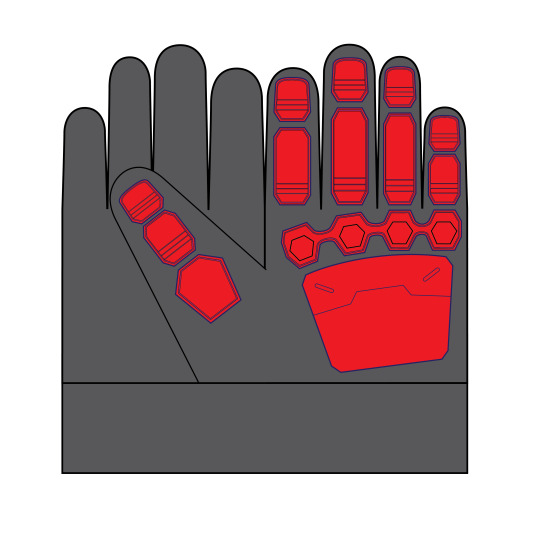
Next, the templates were printed and laid over the glove to check for scale. as you can see, the guard on top of the hand is much too large. I made a few adjustments to the paper templates, scanned them, and modified the vectors to fit.

Then it was cutting time! Only the finger and knuckle guard bases were made from heat transfer vinyl. (If I didn’t have access to the die cutter, I would have traced the templates onto masking tape and used them as a mask for fabric paint.)

Next I wanted to make the knuckle guards. These could have easily been made with Sculpey, but I sit next to a 3D printer all day at work so I took the easy way out.
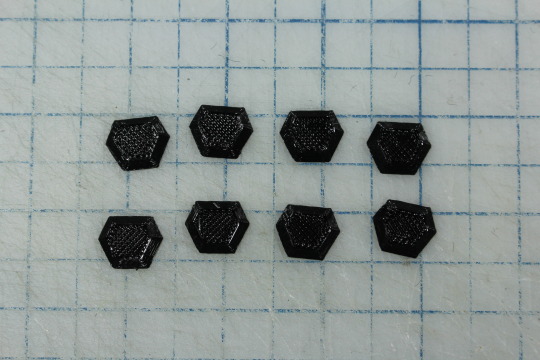
As normal with 3D prints, these had a distinct texture. I decided to take the opportunity and try out Automotive Filler Primer since it’s supposed to be the bee’s knees for smoothing 3D prints. Sanding PLA sucks, so I’ll jump on any possible opportunity to avoid it. In preparation for spray painting, the knuckle guards were stuck on a piece of cardboard with hot glue. A little clearance from the surface means their edges will be more clean, plus I don’t need to keep track of 8 tiny pieces of plastic. The hot glue will peel off cleanly later.
From what I had heard, you don’t need to sand filler primer because it self-levels. After one coat, I was not so sure.
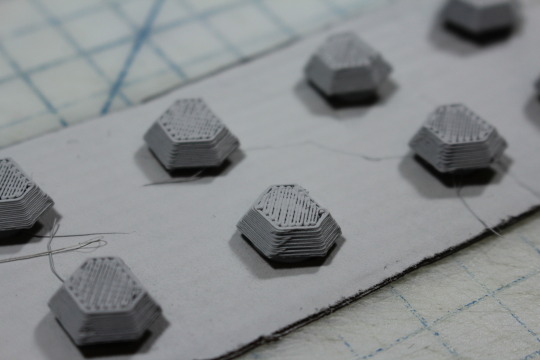
Three coats in and the ridges were actually more pronounced, so I broke out the sandpaper.
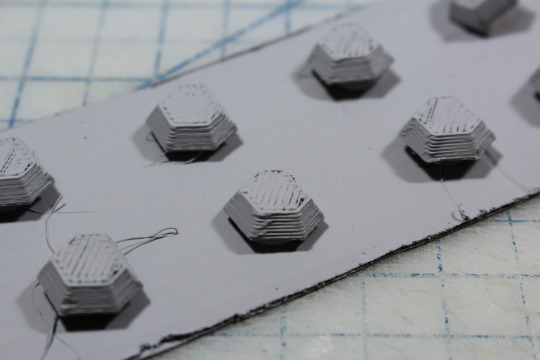
Amazing!!! It looks awful but dang did it feel smooth and it sanded SO MUCH EASIER than PLA! 220 grit paper was plenty remove material.
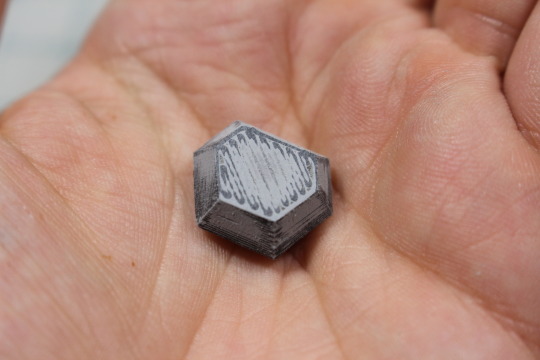
After two more passes of spraying and sanding, the guards were looking pretty smooth. Here they are after their final spray:
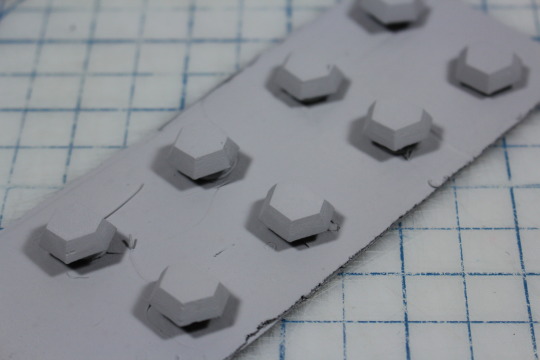
Fun fact, that stuff will clog up your paper something fierce! Buy a lot of sandpaper if you have large things to surface.
Next up was painting. Normally I would spray paint or airbrush something like this, but the weather has not been cooperating lately so I hand-painted them instead.
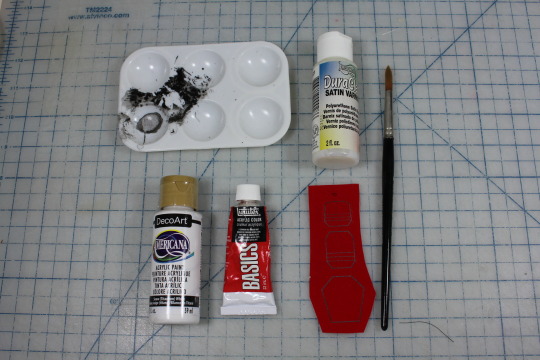
Since the red paint is somewhat translucent, I gave the parts a thin coating of white first. Then red was layered on until I achieved full coverage.
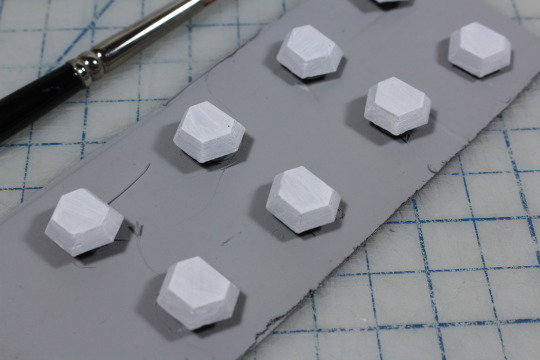
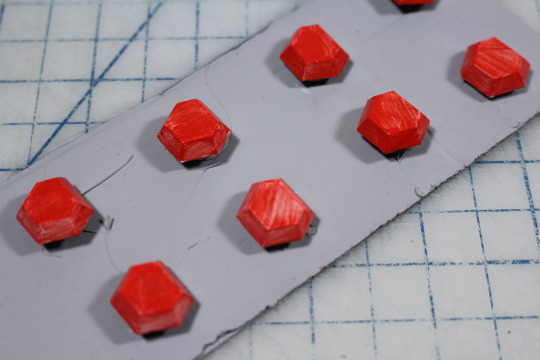
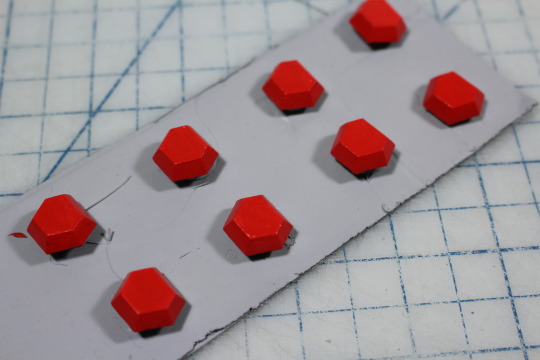
The final detail for the knuckle guards was a thin, black line running around their base. Any permanent marker will do.

The knuckle guards still need weathering, but I prefer to weather everything at once so I moved on to building the hand guards. Using the paper template from Illustrator, I traced the main shape onto 6mm foam. You will notice some indents running along the flat surface:
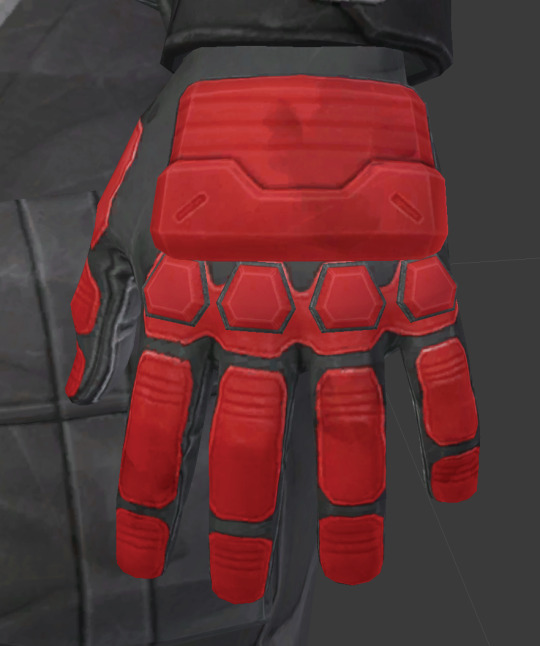
Those were recreated by scoring the foam with an X-acto knife. When blasted with a heat gun, the foam will contract slightly to create a groove (pictures of this later).
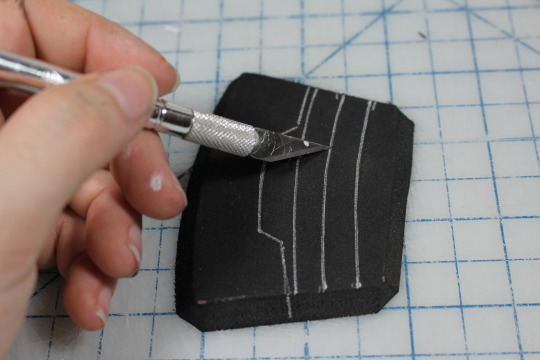
I added a second layer to the guards with 2mm craft foam.
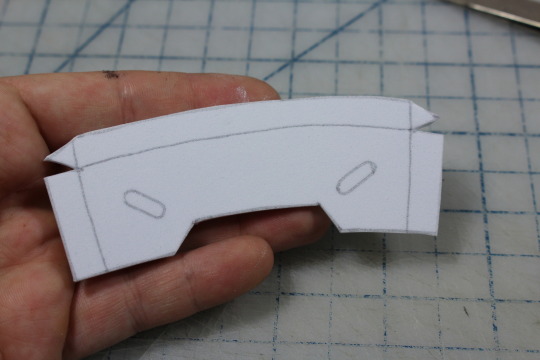
In order to emphasize the angles, I carved a teeny grove with my pen knife and removed the excess material with a pair of tweezers.


This channel helps the foam bend a little sharper. It might seem subtle, but the effect was worth it.

Next, I used a sharpened aluminum tube to punch perfect circles into the foam. You can find these at most hobby stores and sharpen them with a needle file--also to be found at most hobby stores. The holes were expanded into slots using my handy X-acto. This was surprisingly hard to do neatly; I wish EVA foam was a little more dense :/
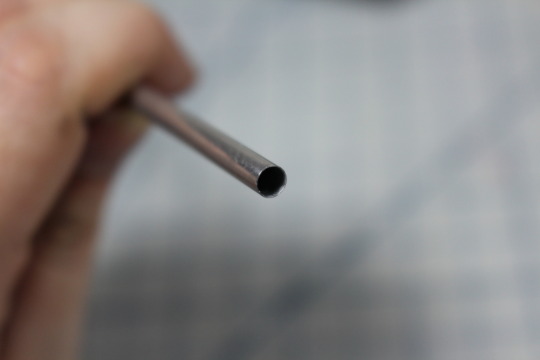
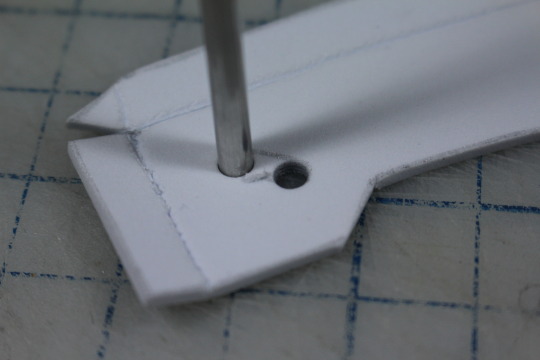
The parts were adhered together with contact cement. I had to do this outside and it was dark, so I don’t have good pictures :( As a last step before painting, I used a heat gun to give them a gentle curve and emphasize those grooves. Unfortunately, I was a little liberal with the heat and you can see some low-key melting. Oops. Given the size of these parts, it was an interesting challenge to attempt without gloves.
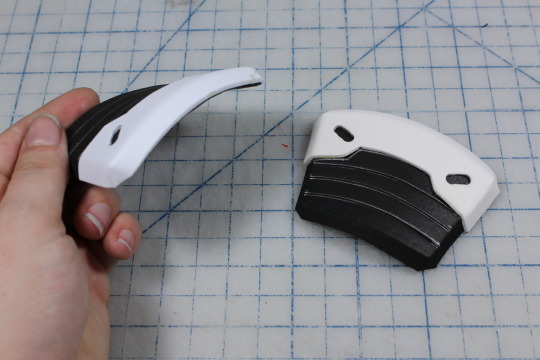
For painting, I decided to use my airbrush. I was gifted a setup yeeeeeeeears ago and I hardly ever use it. Time to change that! I primed the foam with this all-purpose primer which claimed to be slightly flexible. This is a lie. Don’t buy this brand of primer if you need something to be flexible!!
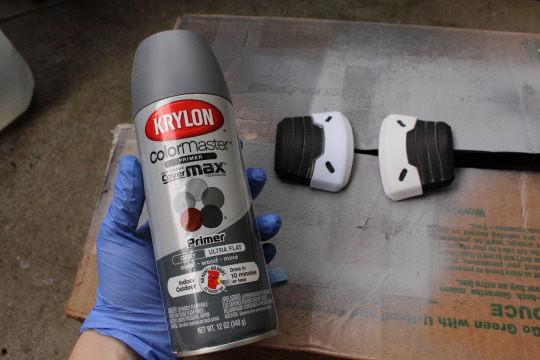
Like the knuckle guards, I gave the hand guards a light pass with white so it would take less red to reach full coverage. Full disclosure, I kind of suck with air-brushes. See that weirdo blob on the left corner of the left guard? That’s what happens when you spray too much paint with an air-brush. They also had a funky texture which I believe was a result of too much paint at once.
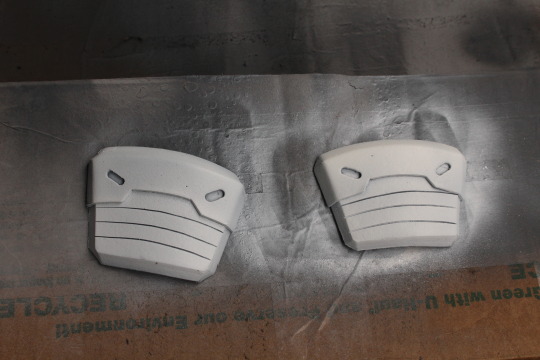
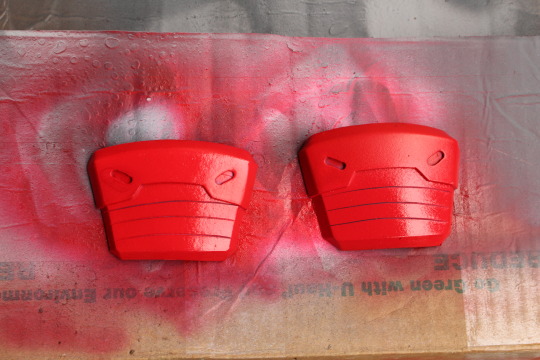
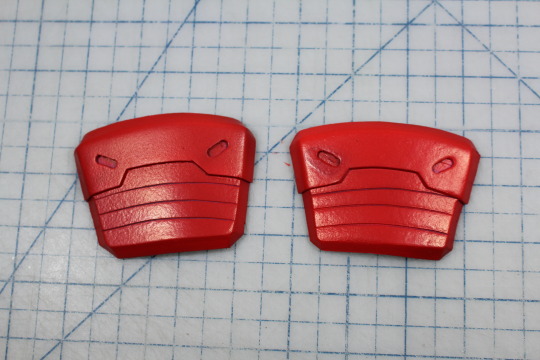
For weathering, I used 400 grit sandpaper to remove paint from corners and edges revealing the primer beneath. I think it gives a pretty neat effect! Grime was a mixture of Mars Black, Burnt Umber, and water. Finally, a coat of brush-on varnish sealed the paint job.


It was only after applying the varnish that I realized it was glossy, so I misted the parts with Matte Fixative meant for sealing drawings. This is not ideal and you should be smarter than me and buy the right varnish to begin with.
Finally, it was time to add the finger pieces and assemble the gloves! This was done with an ancient (circa 1970′s) iron, a scrap of muslin, some cardboard, and sewing pins.
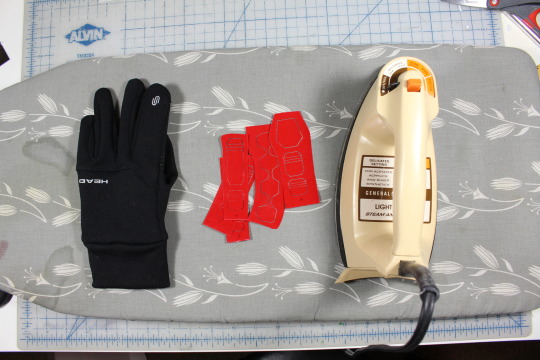
Note about the vinyl: There is such a thing as stretchy heat transfer vinyl. I didn’t know this when purchasing, but stretchy would definitely have been preferable. The fingers of a glove are constantly flexing and moving, so over time my regular vinyl will break down. I did verify that my pattern would stretch, but you should still purchase the proper variety if you choose to do something like this. Thankfully the pattern I cut allowed the material to stretch somewhat.

Once cut, the vinyl needed weeding. Weeding is the process of removing everything you don’t need from the piece to be transferred. While there are specific tools available for this task, I like using an X-acto knife. After you get a piece started, tweezers can help remove the rest. Be very careful during this step; sometimes the machine doesn’t quite slice all the way through and you can pull off the wrong parts.
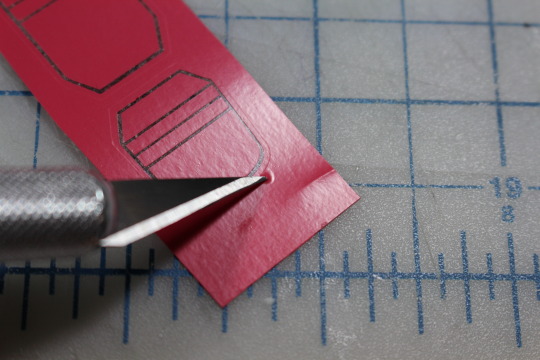
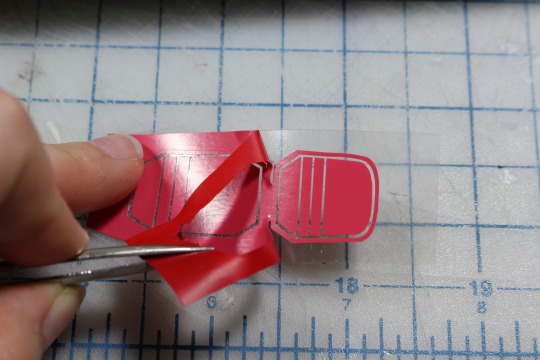
With the parts weeded, it was time to iron them in place. Heat transfer vinyl needs to be pressed while perfectly flat. The fingers of these gloves have gussets on each side which equals a lot of fabric and seams in a small area. Such construction makes them form-fitting and comfortable, but I couldn't get them to lay flat. To remedy this I made an insertable cardboard finger and pinned the fabric in place. It was important NOT to stretch the fabric while doing so or else the vinyl would crumple when un-pinned.
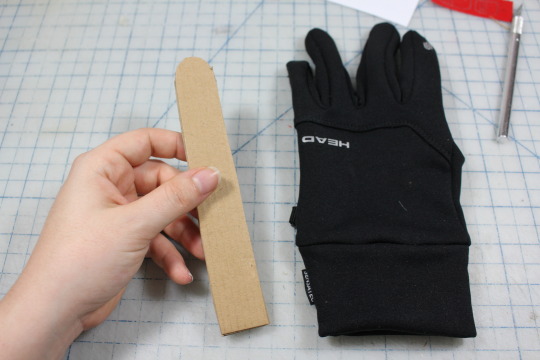


With the fabric secured, I attempted to stick the vinyl in place using the mildly adhesive cover plastic. Alas, it just wouldn’t stay, so I used a snugly pinned piece of muslin to hold it down. 15 seconds of pressing with the iron, and ta-dah! Red decals :)
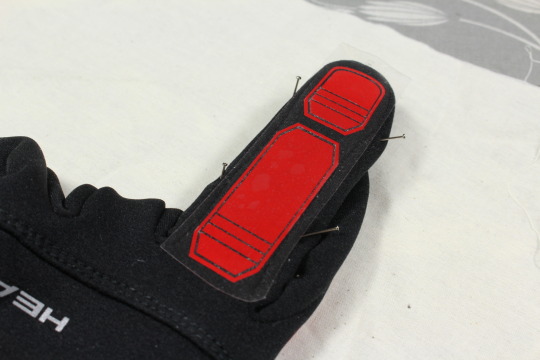

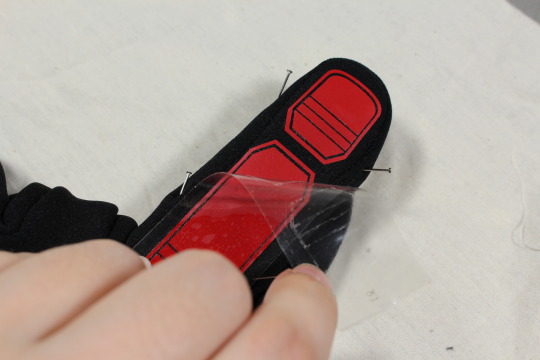

These gloves are two sizes too big for me in case you couldn’t tell :)
Remember how I mentioned that seam across the back causing trouble? Unfortunately it runs right through the middle of a decal. It was very tricky to iron without burning the vinyl and it’s kind of ugly. 10-foot rule will save me, but it could have been avoided by buying better gloves.
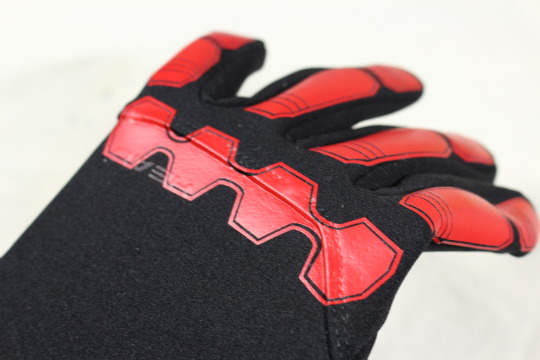
The last step was gluing the hand and knuckle guards in place. Because the fabric is stretchy but my parts are curved, I needed to put the gloves on Casey before gluing down anything rigid. Alas, I don’t have many images here because Casey didn’t feel like being a hand model and we were outside because of glue fumes. Each hand guard got a thorough application of E6000 in the center with hot glue around the edges. I wanted the strength of E6000 but needed the quick dry time of hot glue, so this worked fairly well. Overflowed hotglue was colored with a Sharpie and disappears from a distance.

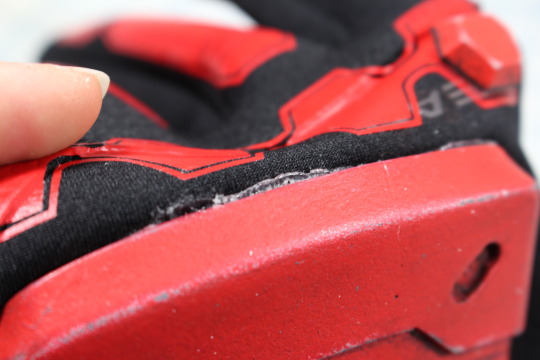
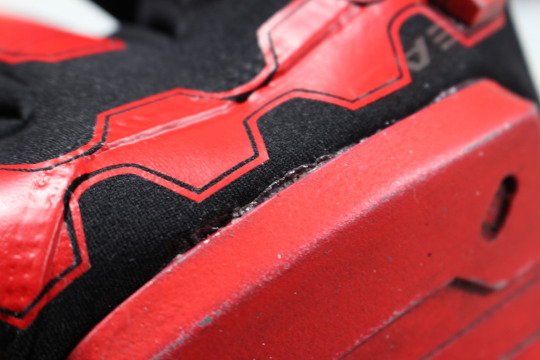
More E6000 was used to fix the knuckle guards. Then the gloves were tossed into the Bin of Shame ™ to cure without fumigating my room.
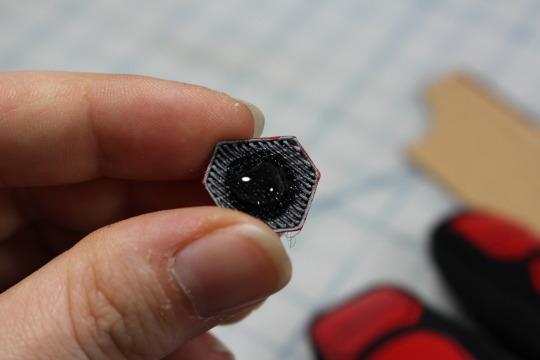

After two days of curing, everything was finished! I'm really happy with how they turned out :D

98 notes
·
View notes
Note
Hi, how are you? May I offer a prompt? How about a Bizarro World remix of your role reversal story? Our world’s Liz wakes up in a world where Red’s a respected law-enforcement figure and she’s a criminal he’s chasing and they’ve never met before in this world? Rating no higher than T would be greatly appreciated. Thanks for considering.
I’m not entirely sure if this is quite what you had in mind, but it’s an idea I’ve had ages ago, and I hope it fits in with what you prompted well enough:
Liz staresblankly down at the scrap of paper between her trembling fingers.
She hadtried so desperately to get it right, to scribble down everything she knew(which, granted, wasn’t much now that she actually thought about it), to keeptrack of everything: names and numbers and dates and events. But there is onlyso much she could do without holding all the pieces of the puzzles inside herhands, frantically scrambling together what little cards she was holding inthis game.
Lookingback up at the impressive building complex looming large into the sky right infront of her, Liz draws in a sharp breath, her insides twisting with a suddenonslaught of nerves. It’s no good though, because as much as she wants to digher heels into the ground and just turn around, this is what she has to do. Soinstead, Liz looks forward and determinedly walks inside.
It’ll bealright, she inwardly berates herself, trying – hopelessly, foolishly – to soothher violently beating heart. If she just places one foot down in front of theother, if she just takes it one step at a time…
The woman behindthe counter gives her an uninterested look, and Liz responds with an overlycheerful smile, just this side of manic.
(It makesher feel like a fraud.)
“Hello. I’mhere to see Assistant Director Harold Cooper.” She makes sure to keep her voiceeven and steady, tries to keep the quiver out of it. To sound self-assured andconfident instead of like a little girl playing dress-up in- well, no. Not herfather’s clothes exactly. But someone else’s nonetheless.
“Do youhave an appointment?”
“I do not.”Liz pauses, swallows past the lump in her throat. It’s not too late to turnaround, she can still end this. But ultimately it wouldn’t change a thing aboutthe fact that this is what she’s got to do. She’s sure of it. And yet, eventhough it all boils down to the fact that this is her only option, Liz can’tquite shake the feeling that this is all so wrong. It’s like watching herselfthrough a distorted mirror at a carnival’s fair.
“Tell himit’s Elizabeth Keen.”
And becauseshe has seen the security footage of hiscapture at the FBI’s headquarters countless times, Liz knows that she’s gotexactly ten seconds to turn around, strip out of her tastefully expensiveChanel coat and kneel down on the oval emblem painted onto the center of thefloor.
Indeed, it’sonly moments later that she’s surrounded by a number of heavily armed men, eachshouting orders as they aim their weapons at her. It’s peculiar and unsettling –because even though she had anticipated this moment, had known that it would come as assuredly as one knows that summerfollows spring, Liz still feels her heart clench inside her chest.
It’ll allbe alright though, she silently tells herself as they haul her away. As long asshe keeps sticking to the script she will be just fine.
–
Liz hadnever much cared for science fiction.
Tom hadloved to watch the X-Files and so, in the initial honeymoon phase of their relationship– back when everything had still been rose-tinted and terribly exciting – Liz hadmade an effort to catch a few episodes with him. Still, her version of the FBI’stasks and duties had differed considerably from those presented on screen, somuch so that she couldn’t help but be bored out of her mind by the lack ofpsychopaths and criminals with sociopathic disorders.
But now? Nowshe had gained a new appreciation for Mulder and Scully’s bizarreout-of-this-world experiences and phenomenon. The ones that couldn’t be rationallyexplained away. Like walking up on Groundhog Day 200 times in a row, or beingable to hurl oneself off a bridge or into a raging fire without actually dying.
Or – as inher case – waking up in a world which looked the same and even felt the same,but which was somehow completely different, starting with the differing brandtag in the back of her thighs and ending with the fact that her formercolleagues and friends were now apparently chasing her through the nefariousworld of crime.
Around her,the lights are slowly dying down, dimming until she is able to glimpse pastethe glass exterior of the Box.
That mustmean he’s here, then. Just as she knew he’d be.
Drawing ina deep breath – letting the cold air fill her lungs before eventually expellingit once again – Liz thinks back to the scrap of paper she had mindfully destroyedjust before surrendering herself to the FBI. She wasn’t much of a writer, buther note-taking was sufficient enough. She had even bothered to make achecklist, even if it read a bit like an IKEA instruction: Hire Zamani, lookfor the other Beth, prepare to escape from a military hospital.
(Well, thatlast one was a bit tricky. Because if she’s honest, then Liz hopes that he will show more restrain and refrainfrom stabbing her in the neck.)
Liz is justglad that she had had the time to write it all down, to look for the biggerpicture (which still eluded her for the most part). She’d done it all as soonas she had come down from her bouts of stress-induced depression – or whateverelse it had been that had messed with her psyche right after she had woken up…here. After all, she couldn’t have very well gone to a doctor, not with hersbeing a face that was regularly featured in the news in relation to theft andblackmail and national security threats. Although, deep down Liz hopes thatsomewhere out there she, too, has a makeshift mobile medic unit waitingpatiently at her every beck and call.
After all,that’s the way he does it.
And nowthat she has taken over his role it would only be fair that she gets to haveall the advantages of his criminal empire, too.
Looking up,Liz waits for her eyes to adjust to the glaring lights and flickering shadowsbefore finally allowing them to focus on his face.
He looksjust the same, and yet so uncannily different that it makes her stomach lurch.Truthfully, she hadn’t been prepared for this moment, had known that it wouldcome – yes, but actually living through it? That was something else entirely.
(Hell. Itwas hell.)
Lizswallows.
“AdmiralReddington,” she says, her voice sounding surprisingly steady. Smug andknowing, just like his had once upona time. “What a pleasure.”
“Well, I’mhere.” He says somewhat disinterestedly, spreading his arms out in front of himand Liz finds herself on familiar grounds. She’s glad that he is sticking tothe script at least because as long as he does – as long as neither of themdigresses – she can do this. She can retrace her steps, take them back to thepoint where everything changed – another ordinary, lonely night three yearsfrom now.
If she canjust hold on to the slippery shreds of sanity long enough, that is. To thestrings of reality that keep unravelling like quicksand between her shakingfingers, left and right and upside down and right around her throat and pullingtight.
And maybe,in a few years from now, she’ll be able to make her way back. Back to her Reddington and Agnes and everythingfamiliar. Back to the taskforce and the not-quite ordinary life in which shewas nothing special. In which she wasn’t #4 on the FBI’s Most Wanted list.
Biting theinside of her cheek to keep the burning sensation behind her eyes fromfestering, Liz forces a coy smile.
“Do you getback home much?” The words taste bitter on her tongue. Mocking. “I haven’t beenhome in years.”
#the blacklist#lizzington#prompt#gosh I had so much fun with this; it practically wrote itself in five minutes#thanks for prompting; I hope it's alright#unruhigwandern
13 notes
·
View notes
Text
So I have a sort of headcanon about the Snack Pack I would love to eventually write about but so far I’ve only got short-hand prompts written out but here’s the main thing:
The Snack Pack pretty much first formed because they were, in a way of sorts, outcasts in their society. Not that they were treated poorly of course, trolls in general are loving and friendly; but they’re “special” trolls always put up in a pedestal; revered but never treated like normal.
Special troll subspecies were considered the most delicious to Bergens, so of course they’re usually the first to be eaten (and hence why Chef happen to specifically select them), and the Snack Pack happen to be lucky enough that they were young enough when the trolls escaped so they wouldn’t have become instant meals. But that means theres so few of their subspecies, and the surrogate trees can’t really produce the special trolls like the Troll Tree could; they can barely produce regular rainbow trolls without most of the pods withering in the first week.
So here are these lonely individuals that feel like theres no one they can relate to, but eventually Princess Poppy brings them all together into this one unique clique of friends.
First you have Cooper: one of the rarest subspecies, and the only one of his family that could actually talk coherently (most trollimals only speak during songs, like parrots imitating sound). So he’s actually this highly intelligent person by trollimal standards, but not much by rainbow troll’s, and is often talked to like a helpless child. But the Snack pack sees his true nature and often encourage him to speak his mind, even if what he says doesn’t always sound smart.
DJ Suki is another rare subspecies with not much difference from the rainbows besides her gem, but on top of that most trolls are very put off by her because she had the brilliant idea to use bugs to make mixes, and most trolls think bugs are just gross, dirty creatures and here’s this gem troll whose pod is just covered in so many of them. But of course Poppy and the gang think it’s so unique and support her new music style, which eventually becomes popular.
Biggie, the giant troll, comes from a family of rainbow trolls (his grandfather, another giant troll, is long gone by then), so his parents have a hard time adjusting to caring for a giant child so they usually focus on his siblings. Biggie takes company from the family’s pet worms, the Dinkles, where he’ll eventually recieve Mr. Dinkles from a litter years later. In addition to being overlooked, he just doesn’t always fit in most troll’s pods, so going to a party indoors is a hassle and makes him feel left out. Eventually the Snack pack realizes this and bring their large parties outdoors for him, with most indoor parties becoming sleepovers when theres a lot less trolls around. They never speak about it outright, but Biggie understands exactly what they’re doing and just loves them for it.
Satin and Chenille would’ve been regular rainbow troll twins, but because they’re conjoined they’re somewhat known as “trolls gone wrong” (aka defects). In their early years, many insisted (behind their parent’s back) that they just simply separate their hairs and become separate people, but it’s just so physically and mentally painful for them to be apart for long periods of time and it nearly killed them both during their childhood. It was Poppy that had to plead to her father to decree that the twin cannot be separated against their own will.
Smidge is currently the only teaspoon troll; many wonder if she’s actually a subspecies or a “defected” rainbow troll. Her parents waited a little too long to plant her seed because the majority of the pods grown in the surrogate trees just wither away. But eventually the seed cracks and the parents freak out and plant her right then and there. By miracle, she blooms, but she’s so tiny and her voice is so deep. To this day, she’s still treated like a little girl that needs to be coddled rather than a maturing teen that’s more than capable. It’s also the main reason she worked out her and body so hard to become strong and show her independence. And of course the Snack Pack are her biggest supporters.
Glitter Trolls are uncommon but not rare, but Guy Diamond stands out amongst them because of his unusual auto tune voice. So many trolls disregard his singing as “true” vocals, and find it pretty unappealing. However, the Snack Pack worked hard to come up with songs and melodies that work with his unique voice, showing the great potential it has.
Fuzzbert and other hairy trolls are usually the quiet, overlooked subspecies in the background; they mumble and can barely be heard if you’re not listening close enough, and they’re the last ones to be picked for a choir. Most of them accept this and delegate to quieter tasks, but Fuzzbert dared to dream bigger. He wants to be heard, he wants to be liked, even if no one can hear him. Surprisingly, it’s actually Branch with his super sensitive hearing that managed to help him become a part of the not-yet Snack Pack; Poppy, her friends, and some other trolls were part of a temporary planning committee for King Peppy’s upcoming 15th Coronation Anniversary. Fuzzbert has a great idea, but just couldn’t be heard. Branch, who was dragged along by Poppy, tells the others to shut up and listen to the fuzzy little guy. It became the first time Fuzzbert had an audience, and in the end the group went with his idea.
And of course we have the one and only princess. You’d think she was on top of the world, but it’s due to her royal status that she actually was just as lonely as the rest of the not-yet Snack Pack. It’s hard to make friends when the other children are taught to treat her differently, better, more important. She just wants to play and have fun like everyone else; she’s not her title, she’s a person too. She’s pretty much the one that eventually seeks out and befriends the other lonely kids who would eventually become the Snack Pack.
Creek is just the jerkface regular rainbow troll who pretty much asserted himself into the highly idolized “special clique” until they accepted him. Most of his antagonization over Branch is basically the fact that the Snack Pack (especially Poppy) tries so hard to make Branch part of the group, taking focus away from him; the Creek that eventually makes most of them give up, besides Poppy.
The Snack Pack (in the early years) and Poppy tried so hard to make Branch a part of the group (and be as friendly as they possibly can with such a negative person) ‘cause they understand what it’s like to be lonely, to not fit in anywhere. At the same time, they’re baffled that someone would choose to be alone, and go completely against the lifestyle of troll-kind. Even with Creek’s persistence to give up on the grumpy grey guy, they still have just the tiniest hope for him (mostly thanks to Poppy optimism), and thus try to bring him into their group hugs as much as possible (though admittedly they’re not as enthusiastic about inviting him to a party he’ll end up ruining).
The “Snack Pack” term comes in during one picnic where Cooper pretty much says “the pack that snacks together, stays together,” which he pretty much regrets saying at first because he’s used to others waving him off, but instead he receives such positive feedback. The name stuck, despite Branch’s protests that they’re pretty much just screaming to be eaten, and they’ve been the best of best friends ever since. Even though they eventually find friendship in other trolls, and expand their circles, they remain the special little clique that joined together at their lowest points.
#there is so much here#it is thought out so brilliantly#i love it so much#please appreciate this#dreamworks trolls#the snack pack#dw trolls#submission
99 notes
·
View notes
Text
Top Stiga Table Tennis Table Reviews

Table tennis has been one of the most popular sports for many years. Playing table tennis is more enjoyable activity rather than few other games. It is also referred to as ping pong. In this sport, players use a lightweight ball and hit it across the table. In general, the person who misses to return the ping pong ball within 2 pitches, the opponent is given point. The table has to be of specific length, wideness and height and it is manufactured from timber. The tennis table is divided into two sections. The table surface should be in colors of green or blue with a steel net. There are many manufacturers providing table tennis table with superior quality. The table tennis frames are made from steel.
Top 3 Stiga Ping Pong Table
The Stiga brand is to Ping Pong and Table Tennis what other famous brands are to fast food. They are one of, if not the widest known brand on the market, being sold in hundreds of countries worldwide. There are a range Stiga indoor and outdoor ping pong table supplies, each with their own special attributes.
STIGA Advantage Table Tennis Table
Are you pretty serious about table tennis? Maybe your family is looking for a table to get things going. If you are after a table tennis table that offers able support, great bounce, and excellent all-round features, then Stiga Advantage table tennis table is the deal. Just like any other product made in the stable of Stiga, this table tennis is quite weather resistant, durable, robust, and has quite a few features that have become popular among table tennis buffs.

Features
Here is a list of main features that I found in Stiga Advantage table tennis table.
• black edge-banded top
• net and posts
• Steel legs that open by itself
• High quality steel chassis that offers stability with the help of support channels
• 4 inch mag wheel casters
• Brakes that lock
Who is it for?
This amazing table tennis table is a good pick if you are after something that is meant for home use. It’s good to train and lets you get the hang of the game, since it doesn’t have any defect or things to complain about. For those who want to train, it is a very good option, however, I’d not recommend it for organizers who run a serious tournament.
Pros and Cons
Stiga Advantage is quite easy to assemble for some, and it doesn’t take much time either. This user-friendly table stands out for its durable black edge top of 5/8-inch, and 1-½ -inch round steel legs that could glide open. For better stability, the sturdy steel chassis is fitted along with a few support panels whereas the cross brace as well as the 2-inch steel apron give it that extra stability and support to boot with uniform bounce. The ball bearing mag wheel casters offer great mobility and the wheel locks in the form of foot brakes are also quite useful. Some of the other qualities include corner protection pads, net and posts, easily foldable design, striping of silk screen right across its top and most importantly the 1 year warranty (limited). This sums up the build, quality, durability and reliability of the surface of this table. Now you know that the table is hard and withstands any wear and tear, you need not worry about it being hefty and unmovable. This one is just a breeze to move, due to the double caster wheels which are measured at 4 inch each. The table is so good to be folded up for individual training aside from the traditional two or four player competition. As for a few bad points, the instructions could have been a bit easier for quicker assembly, as many hobbyists did find assembly a bit trickier. Sometimes, it seems as though it is inclined to wobble.
Why you should buy it
It has got very good and consistent bounce, and a very even surface that is supported by a very thick board. It should work just fine for you to be able to train effectively.
Verdict
Stiga Advantage table tennis table has got a good number of features which I consider are characteristic of a useful table with impressive set of features. Though it is pricier than the other models of its range, it is worth the money that you shell out for it.
If you are looking for a table tennis table that the whole family can enjoy then the Stiga Advantage Table Tennis Table will provide a very high quality solution. It is quick to assemble and easy to use. It features a strong top, black in color with a regulation edge band. It has a very solid structure and strong and thick easy opening steel legs. As well as the strong legs the table has a solid apron structure to keep it stable and secure during play. It really is the case of folding open the table fix on the net and you are ready to play.
The Stiga Advantage Table Tennis Table lets you get started with the game almost straight from the box. It is a great table with a table like this because they can often come with multiple parts and complicated instructions. Sometimes they can literally take hours to put together with the high potential of making a mistake and ending up with an unstable playing surface. The table tennis table does away with all these problems. It is really very quick to get up and running with this table. Once constructed, it folds open smoothly and easily, all you have to do is adjust the legs for stability which is done very easily. There are also foot breaks on the table to fix it firmly in place.
The Stiga Advantage has extra-heavy duty steel support panels that provide a high level of stability in play. The structure combined with the good quality surface of the table provides a really good consistent bounce during your games. Experienced players will not be disappointed with the performance of this table. Because of its quality the table tennis table is a good table for beginners, but it will enable them to progress well beyond an intermediate level. As a home based leisure table it covers all the bases, and it is also good if you start to become serious and want to move on to club level play.
Other great features of the table include a professional striping across the top and corner protection pads to prevent damage and snags to your clothing. The package of the table comes complete with net and net posts are included and they can remain on the table when it folds up. The two halves fit together really well and overlap for easy storage. Most importantly the table tennis table provides a good playing surface with a perfect bounce and playing speed for the beginning and intermediate player. As a leisure facility for your home the Stiga Advantage Table Tennis Table will provide fun and quality for a long time and will always be a poular item to get rolled out at parties and family events.
Stiga Expert Roller Table Tennis Review
Stiga Expert Roller Table Tennis Table is an excellent competition table. It has a compact storage system which allows you to store it in a cramped space. Its extra high density top surface provides a good bounce even in the most rigorous testing conditions, and for this it has been approved by International Table Tennis Federation and has been used in World, Commonwealth and European Championships. It is used by more than 90% of Australian professional clubs
Made by world-renowned, Stiga. Through their years of close cooperation with professional Table Tennis players and coaches, they are able to continuously provide high quality Table Tennis equipment that has been regularly used during world competitions.

Main Features
This top of the line Table Tennis table is priced at $1,099. Stiga Expert Roller Table Tennis Table is a high-end, top quality competition table that ensures smooth game plays. One of its popular features is the compact storage system which allows you to fold the table in half, facing each other therefore, making you save more space than the featured table storage position of other Table Tennis table in the market.
• 25mm fibreboard extra high-density top surface
• 4 rotary wheels for each table which makes it easy to move around
• Self-opening sturdy steel legs
• Durable Euro-design chassis
• Features versatility with its playback and storage position
• Includes tournament net and posts
Who is it for?
It is a must in every professional clubs, institutional and competition use. Great for serious players because if its tournament quality top.
Pros and Cons
Made from top quality materials, Stiga Expert Roller Table Tennis Table is built to last years and years of hard plays. Its extra high density top surface provides a great bounce perfect for serious players who are very particular on this aspect. Do not be intimidated with this top of the line table as it is surprisingly easy to assemble and its compact storage system makes you save more space compared to other Table Tennis storage position. Folding it in half with two tables facing each other protects the top surface when in storage. Its heavy duty steel chassis assures you that this will last for many years of hard court action. Their self-opening leg makes it easy to set up. More or less it will only take you 45 minutes to complete its assembly. Its 4 rollers per table provide ease in moving it around. Surprisingly, it is not that heavy compared on how it looks. Its adjustable legs conform to different players’ physique. It can also be played using playback mode for self-practice. The wheel brakes provides stability when playing, you are assured that it won’t move or shift when the playing gets rough.
Why you should buy it?
If you’re looking for a Table Tennis table that would last for years of extensive use, this the one for you. This Stiga Expert Roller Table Tennis Table is great especially to those who are very particular with the way the ball bounces, like the serious or professional players. As this is widely used in world championships, owning one would definitely boast your pride and self-esteem in playing. It is great to show-off to your fellow Table Tennis players. Having this in your local clubs and sports institution can add value to your organization, making it a hotspot for tournaments.
Verdict
Truly, this is a must for every serious Table Tennis players. It might be costly but it is sure worth your money.
Stiga Legacy Table Tennis Table Review
In this article, after going over a few details about ping pong table we will give you 12 indoor and outdoor best ping pong table review with pros and cons.
Finally it is always encouraged that before you make a financial commitments to anything, you do a back ground research. In this case, your best bet would be to read the reviews, pick out a particular table and get to see what preceding clients have to say about it in terms of performance, price, durability and everything else. At the end of it all, you will become the new owner of the best table built just for your playing needs.
Maybe you are looking for a table tennis table that is worth its cost. Perhaps you want to buy one that is loaded with cool features, something that offers you scope to harness your skills by being the ideal table tennis that you have always longed to play on. There you have it! With Stiga Legacy table tennis table you could enjoy fast paced gaming wherever you want- be it in your gaming room, garage or basement.
This stunning table tennis is a product from the home of Stiga- world leader in manufacturing of tables and equipment.
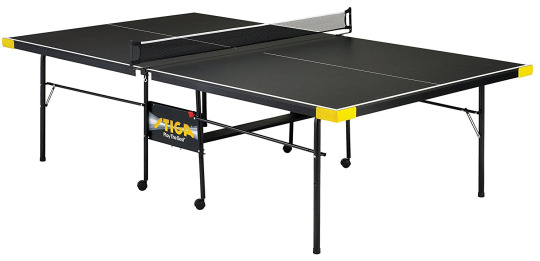
Features
This is a very good option considering a good number of features which are as shown below:
• Sturdy unit with impressive legs made of steel and a steel apron
• Fiberboard top with Matte black that holds the table well for exciting play and livelier bounce
• 108 “x 30”x60”
• Comes with post and net
• Fast-paced gaming enabled by Half inch black surface for comfortable playing
• Safety enhancement features such as corner pads
• Double caster wheels of size 2 inch
• Self opening legs
• 1 1/2-Inches Steel Apron and Black top
• Nets and Posts with Logo
Who is it for?
Though Stiga Legacy table tennis table has all the qualities to support anybody’s table tennis action, it is more suited for kids and hobbyists who want to pass time playing indoor. Whether you are semi-serious about training hard or want to pass time playing it, I’d say, this provides a very good means to do that.
Pros and Cons
This Stiga Legacy table tennis table undoubtedly offers consistent bounce, speed and spin at all times, and the thickness it offers does justice to the materials used, since the precision offered is unmatched. From the looks of it, the top looks much thicker so one can understand how good the playing experience would be. Its fiberboard is made of a very strong material which is said to have been made to offer uniform bounce throughout, thanks to its high quality uniform density make. This clearly translates into fast-gaming experience. While using this one, you would find that this table is resistant to wear and tear no matter how many times you use it every day. This feature accounts for the quality of its make, the robustness of its design and the durability of its construction materials. No wonder why it is one of the premier choices of people who organize tournaments regularly. Adding on to the advantages of owning this table, I felt that playing a game of ping pong is completely unimpeded by inconsistencies that you would normally relate a poor table with. Moreover, the frame which holds the together is made out of first rate steel, so you need not worry about damaging this, you can feel positive that it would take hell of an effort to just dent a hole in the thick legs, sturdy wheel unit and steel apron frame.
This table doesn’t have any deal breaker kind of a drawback, but its price may seem to be very costly for a hobbyist though.
Why you should buy it
Unlike the cheap tables in this price range, the wheels are sturdy, and the table can be folded up without any difficulty.
Verdict
Stiga Legacy table tennis table makes you feel crazy about table tennis.It provides a great table for playing the great sport of table tennis at home. The Stiga Legacy gives you the opportunity to get involved for a great price, but knowing that you are getting a top quality and professional table for your money. It will be great if you have room in your basement, garage, or spare room in the house. With this table you will be getting a sturdy, stable and strong table that will stay solid and stable even during the most competitive games. It is not going to wobble or collapse if it gets bumped into by the exuberant players of the game.
It comes with thick steel legs and a strong steel apron which give the whole structure extra support. Because of the solid and well positioned wheels it is easy to move around. It is therefore a versatile a sensible choice for your home leisure needs. Its quality build and professional standard will last you for many years. You will always be able to get this out for fun at a party or for more serious table tennis games and practice.
Most importantly of all the Stiga Legacy Table Tennis Table plays very well indeed. It has a black fiberboard and very good quality playing surface that enables the ball to bounce very well and consistently, it gives an exciting game and great fast play. Players can set up for a two player game or four player games, but half of the table can also be folded upright for individual practice and play. For safety it has corner protection pads that protect the players and their clothing when they are rushing around it and bumping into it. The table tennis table also features regulation standard striping marks and edging lines. It also comes with net and post system included in the package.
The Stiga Legacy Table Tennis Table is perfect buy for your own family and leisure use at home. It would make a great gift for a family member for birthday or Christmas that is going to last for a very long time after the event. Table tennis can become a great hobby that can last a lifetime. Buying it can be the beginning of a great hobby that can last for a lifetime. It will enable you to practice regularly on a high quality table that will let you build up your skills to a high level.
#table tennis guide#table tennis table indoor table tennis table outdoor table tennis table#stiga ping pong table#Stiga Expert Roller Table Tennis
0 notes
Text
“Hyo Jin Moon described graphically how he would peel off my skin and pull out my toenails.”

Hyo Jin Moon looking at Nansook in court.
Nansook Hong: “In The Shadow Of The Moons: My Life In The Reverend Sun Myung Moon’s Family.” Little, Brown & Co. 1998
Chapter 10
My children had insisted that all they wanted was a little house they could call their own. That’s what they got. We moved into a modest split-level in an unpretentious neighborhood of Lexington, Massachusetts, the birthplace of the American Revolution. It seemed like a fitting place to begin my new life. Like the Minuteman whose statue dominates the town green, I, too, had declared my independence from an oppressor.
There is no freedom, though, without security. At my lawyers’ urging, the first thing I did when we reached Massachusetts was file a request with the court for an order of protection to prohibit Hyo Jin from having any contact with me. I could imagine his fury when he had awakened and found us gone. I wanted to do what I could to discourage him from trying to find us.
In my affidavit filed with the Massachusetts probate court, I tried to explain that this was not a typical domestic violence case. I was afraid not only of my husband but of the powerful religious cult that sheltered him. Attempts by any member to break away from the Unification Church are fiercely resisted. What would Sun Myung Moon and his minions do to get his daughter-in-law and five grandchildren back behind the iron gates of East Garden? The entire legal procedure was intimidating for me, but my fears were eased by the Boston lawyers I had hired with the help of my brother. Ailsa Deitmeyer, an associate in the firm, was especially reassuring, perhaps because she is a woman, perhaps because she is graced with a compassionate heart. She made me feel safe at last.
The court impounded my new address to thwart any efforts by my husband and the Unification Church to contact me. I knew, however, that it was only a matter of time before they learned where I was living. I was a woman with five children, without resources. Where would I go? The Moons eventually would figure out that I had come to my brother; it would not be long before they found me.
I knew that a court order was just a piece of paper, but I thought it might be enough to discourage the Moons from any ideas about taking my children by force. How many custody cases, in circumstances far less bizarre than mine, involve the kidnapping of children?
Standing in the dingy courtroom in Cambridge, I looked past the peeling paint and battered benches. My eyes focused on the American flag. I thanked God I was in America. That flag was protecting me, a Korean girl who had come to this country illegally, who was not yet a citizen. Of all Sun Myung Moon’s sins, I thought, his attacks on America were the most vile. He was rich and powerful; I was neither, but we were equal before that flag. The scales would not have been so balanced in my homeland. For me, on that summer day, the United States meant freedom. The stars and stripes were the most beautiful sight I had ever seen.
After helping me unload the cars, Madelene returned immediately to New York and her job at Manhattan Center in order not to arouse suspicion. Hyo Jin had not guessed her role in our escape. He called her every day to ask if she had heard from me. He ordered her to hire a private investigator with Manhattan Center funds to find me, an order she ignored. When I had not returned or contacted Hyo Jin after a few days, the focus of his demands on Madelene changed.
In a telephone conversation that she recorded, Hyo Jin told Madelene to meet him at the corner of 125th Street and Riverside Drive in Harlem with enough money for him to score some crack cocaine. “I just want to numb this feeling, just do the crack. At least when I do it, I can get lost in it. Maddie, I’m sorry, but I have no other choice. I can’t deal with these feelings. . . . I don’t want to ask anybody else. Come on, Maddie. Do this one for me. Come on. . . . I’ve got nothing to lose, Madelene. O.K.?”
The next day Madelene drove Hyo Jin to the airport for his trip to a drug treatment program at the Hazelden Clinic in West Palm Beach, Florida. He spent the ride detailing to Madelene the torture he would subject me to if he ever found me. He described graphically how he would peel off my skin and pull out my toenails. I had good reason to be afraid of him.
He lasted at Hazelden only a few days before doctors asked him to leave, citing his lack of cooperation. The Moons sent him next to California to the Betty Ford Clinic, where he remained for more than a month in their detoxification program. It had taken the loss of his wife and children to force Hyo Jin Moon and his parents to address his addiction to alcohol and cocaine. I knew they would expect me to be heartened by this development, but I knew Hyo Jin too well. He would do what he had to do to appease his parents, but I had little faith that whatever level of sobriety he reached in confinement could be sustained once he returned to East Garden.
My children and I, on the other hand, were drunk on our new freedom. Our house was cramped, our sleeping quarters tight, but we were together, out of the shadow of the Moons. The kitchen was especially small, although that was not an immediate concern, since I did not know how to cook. Meal preparation was one of so many domestic chores I had never learned to do. The staff at East Garden had met all of my daily needs for fourteen years. Chefs, launderers, housekeepers, hairdressers, nannies, plumbers, carpenters, auto mechanics, locksmiths, electricians, tailors, gardeners, dentists, doctors, and dozens of security guards were always on call. I did not know how to run a dishwasher, how to mow a lawn, how to operate a washing machine. The first time the toilet over-flowed, I called Madelene in New York in a panic.
It was a difficult adjustment for me, but it was harder still for my children, who had been treated since birth like princes and princesses. It was not easy for children accustomed to maid service to learn to hang up their clothes, to take out the trash, and to clean up their rooms, but they did. They learned to share bedrooms and wait to use our one bathroom. No longer part of the True Family, superior in status to their peers, they adapted to the new egalitarian realities of their lives and began to make friends as equals.
I had neither the money nor the inclination to send them to the kind of private schools they had attended in New York. Tuition for them the previous year had totaled fifty-six thousand dollars. If I was going to immerse my children in the real world, what better place to start than the public schools? Lexington is a comfortable suburb west of Boston with an excellent school system. I was grateful for that.
My children and I stumbled toward self-sufficiency together. We had a lot to learn, but we were not alone. My sister and my brother and his wife helped and supported me. Having them close by meant not feeling afraid as we embarked on this new life. The children had their cousins and I had adults who understood the painful and awkward transition I was trying to make. The worries that disturbed my sleep were not the kind a friendly neighbor could easily relate to over a cup of tea.
I had timed our escape so that it would coincide as closely as possible with the start of the new school year. I knew the children would miss their friends, and I was eager for them to be able to make new ones as soon as possible. In September I enrolled Shin June in seventh grade. She would be the only one of my children at the middle school. She was the oldest and the most independent; I was confident that she would do well academically and socially. The other children would all attend the same neighborhood elementary school. The baby would keep me busy at home.
Their teachers reported few adjustment problems and I saw a house full of happy children. Their father had had so little to do with their lives in New York that it was no surprise to me that they felt only relief that he, as well as all the abuse he represented, was absent from their lives in Massachusetts. Shin June played the flute with a local wind ensemble. Shin Gil made friends easily but was very sensitive to being reprimanded, no matter how gently, by me or a teacher. His teacher reported taking him into the hall once when he seemed tearful to ask what was bothering him. “He told me he used to live in a mansion,” she reported. “Now there isn’t much privacy and there isn’t as much to do. He misses his friends. I asked about his dad. He said that once in a while he misses his dad but that his dad was a drunk who yelled a lot.”
Not surprisingly, the first pressure the Moons applied to force us back to East Garden was financial. What savings I had covered our food and basic necessities. My paycheck from Manhattan Center made the difference between being able to pay the monthly mortgage and not. My lawyers had been assured by attorneys for Hyo Jin that those checks would continue to be issued to me until we worked out a temporary child-support arrangement through the probate court.
They weren’t. My lawyers filed a formal request with the court for child support. “It appears Ms. Moon’s check will be withheld, perhaps trying to force her back into an abusive relationship,” my lawyers wrote to church representatives. “Ms. Moon’s decision to seek safety from a horrendously dangerous situation was not reached lightly. Having made the decision, however, she is determined not to return, regardless.”
With my brother’s and sister’s help, I had hired Choate, Hall and Stewart, one of Boston’s finest firms, to represent me in what I anticipated would be a protracted divorce case. We knew I would need the best lawyers in the city if I was going to take on the Moons. Like so many women facing divorce, I had no idea how I would pay my lawyers. In a study on gender bias in the courts in 1989, the Massachusetts Supreme Judicial Court had concluded that “there is too little legal help available to moderate income women, in part because judges fail to award adequate counsel fees, especially during the pendency of litigation.”
My chief lawyers were a brilliant Boston Brahmin named Weld S. Henshaw and his skilled and empathetic associate Ailsa De Prada Deitmeyer. They were confident that the court would require Hyo J in to pay my legal bills. As experienced as he was, Weld conceded he had never encountered a divorce case quite like mine. Hyo Jin Moon was not the typical defendant; determining his real assets would not be a simple matter.
Hyo Jin retained law firms in New York and Massachusetts, including the Manhattan firm of Levy, Gutman, Goldberg and Kaplan. Gutman was Jeremiah S. Gutman, the former head of the New York Civil Liberties Union, the man who had championed Sun Myung Moon’s cause when he was convicted of tax evasion in 1982.
Our case was assigned to Massachusetts probate court judge Edward Ginsburg. He was a fair-minded gentleman, nearing retirement, who ran his Concord probate courtroom in a firm but folksy manner. Something of an eccentric, Judge Ginsburg was easy to spot arriving for work on summer mornings. He was the fellow in the blue seersucker suit with the yappy blond poodle on a leash. His dog, Pumpkin, accompanied the judge to the courthouse every day.
No sooner had I asked the court to require Hyo Jin to support his children than I heard from the Moons directly. Money was a great motivator. In Jin sent a letter through my attorneys to urge me to drop my legal action and come home. She enclosed an audio tape from Mrs. Moon, making the same plea.
It was startling to hear Mrs. Moon’s voice in my new surroundings. She could not hide her anger, but she made attempts to sound caring and to be distraught at my departure. The True Family needed to be intact. The bottom line, as always, was that I was at fault. “Nansook, your behavior is not acceptable to all the people who love you.” She predicted that I would be condemned by many people in the future and urged me to return”. . . without being changed.”
It struck me, as it always had, how selective the Moons could be when applying the teachings of the Divine Principle. No one lived her belief in forgiveness more openly than I. Hadn’t I forgiven Hyo Jin when he left me for another woman weeks after our wedding? Hadn’t I forgiven Hyo Jin when he gave me herpes? Hadn’t I forgiven Hyo Jin when he took up with prostitutes? Hadn’t I forgiven Hyo Jin when he squandered hundreds of thousands of dollars that had been intended for our children’s futures? Hadn’t I forgiven Hyo Jin when he beat me and spat upon me? Hadn’t I forgiven Hyo Jin when he abandoned me and our children for a life of drug and alcohol abuse? Hadn’t I forgiven Hyo Jin when he took a lover on the day I brought our newborn son home from the hospital?
I was not the one who had failed to consider the consequences of my actions. I had spent fourteen years refusing to entertain the idea that I could leave Hyo Jin Moon, that I could make a claim to a life free of fear and violence. I had not left East Garden precipitously. I had tried mightily to make my marriage work. Had the Moons ever thought that it was them, not I, who could be wrong?
In Jin’s letter was similar to Mrs. Moon’s tape in its judgmental tone. She expressed sympathy for my situation but scoffed at my seeking a restraining order against Hyo Jin, a man who had beaten, humiliated, and threatened me for fourteen years. She accused me of exaggerating the claims in my restraining order that I feared for my life. But her major point was apparently to try and convince me not to use the legal system against the Moons.
She hinted that it would be easy to attribute dark motives to my decision to leave. “Some have even commented that you left your husband after all these years only because he had lost his job and his position in the family,” she wrote. I could only convince the family of my good intentions by returning and helping Hyo Jin confront and conquer his alcoholism and drug abuse. “You are hurting everyone who loves you by using the legal system to get what you want,” she said, describing the system as “adversarial” and the end result as hurt for everyone.
It was impossible for the Moons to understand that I had already been hurt. I did not want a reconciliation; I wanted release from the abuse of a violent husband and the hold of a religion that had already consumed twenty-nine years of my life. I had never felt a stronger presence of God in my life than at the moment when I decided to flee East Garden. He had lifted the veil from my eyes; I was seeing clearly for the first time. I would never go back.
On October 25, the court ordered Hyo Jin to make monthly support payments for the children and appointed a social worker, Mary Lou Kaufman, to investigate whether visits with their father were in the best interests of our children. I did not want to deprive my children of contact with either their dad or their grandparents. However problematic the relationship, there was no question in my mind that children deserve two parents and two sets of grandparents. I knew that Hyo Jin loved our children, as much as a man as self-absorbed as he could love anyone. However, I urged Ms. Kaufman not to permit visits until the children were more settled and there was demonstrable evidence that Hyo Jin had stopped abusing drugs and alcohol.
I was especially adamant about confirming his sobriety. Hyo Jin prided himself on his ability to circumvent the law. He had once substituted a sample of Shin Gil’s urine for his own during a drug test mandated by his drunken driving conviction in New York. It was also noteworthy to me that Hyo Jin had not even asked to see his children until after I applied for financial support.
Ms. Kaufman met Hyo Jin in her office for more than four hours over two days in November. In her report to the court, she noted that he was anxious and highly agitated. He had a dry mouth and was hyperventilating. She suspected he was high on cocaine. He laced his speech with obscenities. He told her that my parents were behind the divorce effort, that my mother had proclaimed herself the Messiah, and that my parents intended to use whatever money I got in a divorce settlement to establish their own church in Korea. He brought my uncle Soon Yoo to support this cockamamy theory. Soon, who had been instrumental in my mother’s joining the church, betrayed her to improve his position with the Moons.
Hyo Jin insisted to Ms. Kaufman that he had always been an involved and active father, but he could not tell her the ages of our children or what grades they were in at school. He insisted that if they were not clamoring to see him, it was only because I had poisoned their minds against him. He was shocked to hear that Shin Gil had asked for a picture not of his dad but of one of his toys.
She concluded in her report in early December that no visitation should be allowed between Hyo Jin and the children until Hyo Jin had demonstrated that he had been free of drugs and alcohol for a two-month period.
The children and I were busy preparing for our first Christmas in our new home. My parents were coming from Korea. It had been years since we had all been together. Our reunion would be a celebration of our freedom as well. We decorated the house with the children’s drawings from school and a six-foot Christmas tree.
The Saturday before Christmas, I responded to a deliveryman’s knock at the front door. My heart raced as I accepted a package with a familiar return address. Hyo Jin had found us. I tried to conceal my concern from my parents and my children, but I had become less adept at disguising my emotions since leaving the Moon compound. The package contained several small Christmas gifts for the children and a card addressed to me in Korean. In it, Hyo Jin alluded to my revelations about his substance-abuse problems in court documents and asked how I would feel if my own “nakedness” were exposed to the world. It was a veiled threat to expose a videotape he had made of me in the nude.
My father, noticing my distress, tried to comfort me. “Don’t let him get to you,” my father advised. “If you’re down, he’s succeeded in his goal to hurt you.” He was right. I had done nothing wrong. Hyo Jin had. His letter was a criminal violation of the restraining order that prohibited him from contacting me. The son of Sun Myung Moon still thought he was above the law. I reported the threat to the police. Hyo Jin was charged with a criminal offense.
Through my attorneys, Hyo Jin sent letters to the children, expressing his love for them and his desire to see them. He could not resist criticizing me, however. In his letter to Shin June, he wrote: “Of course I feel angry at times at your mother but I want to forgive her. There are a lot of things you don’t know about your mother but that’s not important. You know why? It is because I want you to be a loving person who can love someone forever and not give up on the person that you love and also learn to forgive them as they face trials that life will offer, as it offers to everyone.”
To Shin Ok he wrote that he knew she loved him. “If there was no one telling you how bad Dad is I truly think you would never think even for the moment that way. You know what? Even if you think Dad is bad I feel OK because I won’t be bad any more.”
He promised all the children that he would write to them again soon but he never did.
In February 1996 Hyo Jin met again with Ms. Kaufman to assess the wisdom of allowing visits with the children. He was outraged that he had been barred from seeing them for so long. He talked about the revenge he would seek against me in court. He told Ms. Kaufman he would hire “a cutthroat legal firm from New York” to ruin me financially. He was attending meetings of Alcoholics Anonymous, he said, and was now committed to a life of sobriety.
Ms. Kaufman granted supervised visits with the children that spring. Hyo Jin saw his children only twice before the man who insisted he had changed forever failed a drug test. Visits were suspended until Hyo Jin could prove to the court’s satisfaction that he was no longer abusing drugs or alcohol. That day still has not come.
For all his accusations of being denied contact with his children, Hyo Jin has made no effort to stay in touch with them. His letters, to be delivered through my attorneys, were encouraged by the court, but he never wrote to them. He does not send them cards or gifts on their birthdays or at Christmas. He does not inquire how they are doing in school.
As troubling as their memories of their father are, his abandonment of them is painful for our children. Shin Gil, the favored son now living on my limited income, especially remembers how his father indulged him at video arcades and with expensive toys. Shin Hoon, the baby who never knew his father, wonders where he is. When I take him to nursery school, he often asks, “When is my daddy going to pick me up like the other kids’?”
Divorce is never easy for children, but for a man who claims to be part of the True Family, the embodiment of traditional moral values, Hyo Jin Moon has made it much more difficult for our children than it needed to be.
The Moons did not always pay the court-ordered child support. When they did, the check always came late and only after reminders from my lawyers, who were billing me for more hours than I could ever hope to pay. I had to sell some of my jewelry one month to pay routine expenses. Hyo Jin’s position was that he could not pay my legal bills because he had no source of income. He had been fired from Manhattan Center and cut off from the True Family Trust. He asked the court to believe that the son of one of the wealthiest men in the world was destitute.
Judge Ginsburg was not buying it. The lines between Unification Church funds and Moon family money and Hyo Jin Moon’s finances were imaginary. Hyo Jin had access to limitless funds while reporting few assets and only modest income. In terms of housing, travel, cars, private schools, and servants, he and his siblings lived without any budgetary constraint. For Hyo Jin to argue that he had no money because he was unemployed was to ignore the fact that his employment at Manhattan Center Studios had been no more independent of his father than his living arrangements. His father housed him, fed him, and employed him. Take away the Unification Church and the uneducated Hyo Jin Moon was unemployable. It was laughable to suggest that whatever assets he had, and he claimed he had few, had been acquired in any way other than through the largesse of Sun Myung Moon.
To maintain the fiction that Hyo Jin was destitute, one had to ignore that all his income led back to the same source: Sun Myung Moon. Noting the fine cut of the suits being worn by the army of attorneys from Boston and New York who accompanied Hyo Jin Moon to court, Judge Ginsburg ordered him to pay my counsel fees or face arrest for contempt of court.
The Moons would not pay. That summer Sun Myung Moon sponsored an international conference in Washington, D.C., to discuss how to restore traditional family values. The irony was almost too rich. Hyo Jin Moon could not attend the two-day symposium in the Great Hall of the National Building Museum to hear speakers such as former presidents Gerald Ford and George Bush, former British prime minister Edward Heath, former Costa Rican president and Nobel Peace Prize winner Oscar Arias, and Republican presidential hopeful Jack Kemp address the erosion of family values around the world. Sun Myung Moon’s son was languishing in a Massachusetts jail cell, where Judge Ginsburg had sent him for defying his order to pay my legal bills. He would remain there for three months, winning his release only after he formally filed for bankruptcy in New York State to prove that he was a man without financial resources.
Money became a constant source of worry for me. What if the Moons did not send the check? What if my lawyers got tired of waiting to be paid? How would I care for my children? I had an undergraduate degree in art history. I wasn’t qualified to do anything more than volunteer as a tour guide at the Boston Museum of fine Arts. That would not pay the dental bills for five children. In my desperation, I applied for a sales position at Macy’s department store at the local shopping mall. I completed the training course by asking my sister and Madelene to baby-sit. Madelene had left the church one month after I did and moved close by. I could not have gotten through my first year of freedom without her and my sister and brother. Only when I was trained did I learn that Macy’s expected me to work every weekend. How could I? Who would watch my children? I returned home, feeling defeated.
Independence has its price. I needed to settle my divorce case and move on with my life. I would need more education if I was going to land a job that would allow me to give my children the advantages they deserved, advantages their cousins in East Garden took for granted.
Through my attorneys, I proposed a divorce settlement that would sever my ties forever to the family of Sun Myung Moon. I asked that trust funds be established for me and for my children from which I would pay for our health insurance, education, clothing, housing, and all other expenses. There would be no alimony and no child support. I would pay my own legal fees. My lawyers summarized my intentions in the proposal:
“The concept of a trust such as this would insure there was no likelihood of these assets being dissipated so that the settlement could truly be finished now and forever with no second chances.”
Sun Myung Moon refused. He was firm that Hyo Jin’s financial situation was independent from his own. He would not take responsibility for the future well-being of his grand-children. In addition, the Moons demanded that the terms of any divorce agreement remain confidential. They did not want me to talk. I refused all demands for confidentiality.
In a deposition filed with the court in July 1997, Sun Myung Moon made his position clear.
When my son, Hyo Jin Moon, was cut off as a beneficiary of the True Family Trust and was discharged from his position as an employee, officer and director of Manhattan Center Studios, Inc. and was subsequently discontinued from his status as a disabled employee receiving disability payments from Manhattan Center Studios, Inc. my concern and love for his five children, my grandchildren, moved me to provide support funds fixed by order of the court in Massachusetts having jurisdiction of the dispute between my son and his wife.
My son, Hyo Jin Moon, had and has no control over whether I choose each month to make and continue to make such payments. They are voluntarily made by me so long as I am able and willing to do so.
Negotiations have broken down and I now learn that my daughter-in-law is making efforts to re-incarcerate my son, despite the fact that he has no assets or income other than a $3,500 gross salary per month from his re-employment by Manhattan Center Studios, Inc. I am re-thinking the situation.
The implied threat, that if I did not settle on the Moons’ terms, child support payments would be cut off, was not subtle. The Reverend Moon paid fifty-thousand dollars toward my counsel fees to keep his son out of jail, not out of respect for the court that ordered the bills paid.
“I am pleased that Hyo Jin Moon has recovered sufficiently to resume his productivity as a producer of musical recordings and I hope he will be able to continue to be artistically creative and productive and to earn sufficiently so that I can discontinue supporting him as I have consistently done since he was cut off from all income,” the Reverend Moon said, still ignoring the reality that Hyo Jin’s job only existed because his father created it.
Our divorce case had produced enough paper to make a stack of legal documents two feet high. It had dragged on for two and one-half years. Sun Myung Moon had displayed more willingness to pay hundreds of thousands of dollars to lawyers than to guarantee the future security of his grandchildren. So much for family values.
In December 1997 I settled for a token lump sum payment and a continuation of monthly child support. If we were dependent on monthly support payments, I knew we would forever be at the mercy of the Moons. Once the litigation had ended, Sun Myung Moon could cut off the money at any time. I could not imagine a more likely candidate for a “deadbeat Dad” than Hyo Jin Moon.
Still, I wanted this to be over. I was tired. My attorneys had fought hard and done the best they could for me. I could not have asked for better counsel. How many other women in protracted divorce fights felt just as I did: he with the most resources wins? There would be no alimony, no compensation for the fourteen lost years of my life. There would be no trust fund to ensure that my children had access to a college education. If the children wanted money for schooling, Hyo Jin’s attorneys told my own, they would have to come to Sun Myung Moon personally and ask their grandfather.
I did not oppose supervised visitation by Sun Myung Moon and Hak Ja Han Moon, but I was skeptical that they were sincere in this demand. In the two and one-half years that had passed since we fled East Garden, they had not written or called their grandchildren once. They had not remembered them at Christmas or on their birthdays. They had displayed the same indifference to them as had their son.
At 9:15 A.M. on a cold, sunny December morning, I stood across from Hyo Jin Moon in the well of a small courtroom in Concord, Massachusetts. I answered, “Yes, Your Honor,” when Judge Edward Ginsburg asked me if my marriage was beyond saving. Hyo Jin mumbled a disrespectful “Yeah” when asked the same question. Judge Ginsburg reminded us, as he did all divorcing couples, that marriages end but parenthood does not. He granted my request to legally restore my maiden name, and with the flick of a judge’s pen, the nightmare that was my marriage to the abusive son of a false Messiah was over at last.
No one had really won. Not me. Not Hyo Jin. Not our children. Only Sun Myung Moon had gotten what he wanted all along. My children and I had slipped out of the grasp of the Unification Church, but we were destined to remain in the shadow of the Moons.
Nansook Hong’s video gets over one million views
Japanese language 洪蘭淑 video transcript
Korean language 홍난숙 video transcript
Spanish – Nansook Hong entrevistada en español
Polish – Wideo: Nansook Hong w rozmowie z Mike'em Wallace'em.
_____________________________________
Hyo-jin Moon jailed for 90 days for failing to pay Nansook Hong as ordered by the court
Nansook Hong was interviewed by Rachael Kohn in 1999
Nansook Hong is welcomed to the TIME room. October 1998
Nansook Hong interviewed by Herbert Rosedale
Nansook Hong – The Dark Side of the Moons
Nansook Hong – [C-Span] Book Discussion – ‘In The Shadow of the Moons’ with FULL TRANSCRIPT
Hyo-jin Moon and guns
_____________________________________
Book in four parts, English:
Nansook Hong – In The Shadow Of The Moons, part 1
Nansook Hong – In The Shadow Of The Moons, part 2
Nansook Hong – In The Shadow Of The Moons, part 3
Nansook Hong – In The Shadow Of The Moons, part 4
___________________________________
Book in four parts, French:
« L’ombre de Moon » par Nansook Hong, partie 1
« L’ombre de Moon » par Nansook Hong, partie 2
« L’ombre de Moon » par Nansook Hong, partie 3
« L’ombre de Moon » par Nansook Hong, partie 4
J’ai arraché mes enfants à Moon – Nansook Hong
___________________________________
Book in four parts, German:
Nansook Hong – Ich schaue nicht zurück, Tiel 1
Nansook Hong – Ich schaue nicht zurück, Tiel 2
Nansook Hong – Ich schaue nicht zurück, Tiel 3
Nansook Hong – Ich schaue nicht zurück, Tiel 4
___________________________________
Nansook Hong information in Spanish:
Nansook Hong entrevistada en español
‘A la Sombra de los Moon’ por Nansook Hong en español
___________________________________
Nansook Hong book in four parts, Japanese:
わが父文鮮明の正体 – 洪蘭淑
わが父文鮮明の正体 – 洪蘭淑 2
わが父文鮮明の正体 – 洪蘭淑 3
わが父文鮮明の正体 – 洪蘭淑 4
文鮮明「聖家族」の仮面を剥ぐ – 洪蘭淑
0 notes